Dublin
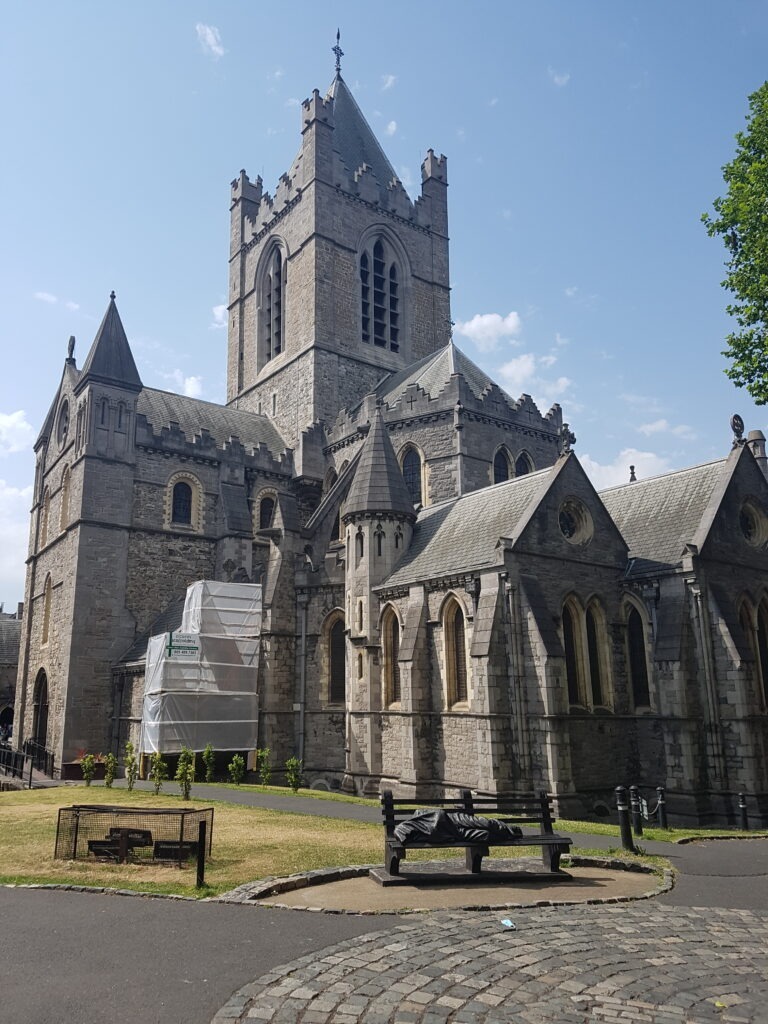
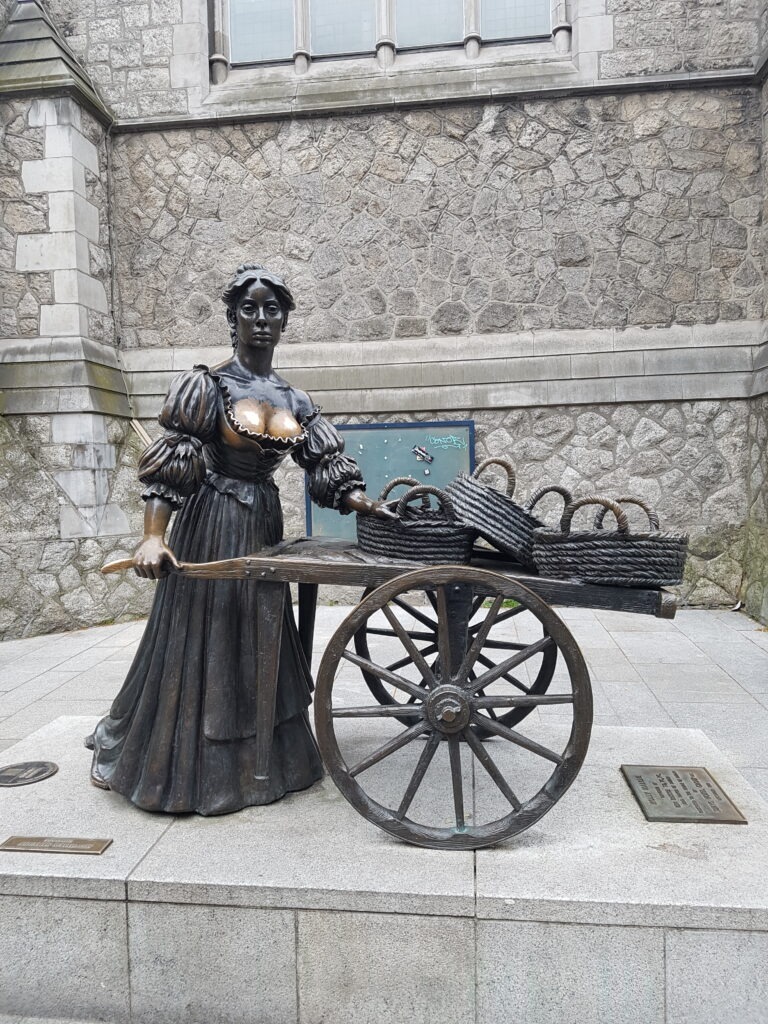
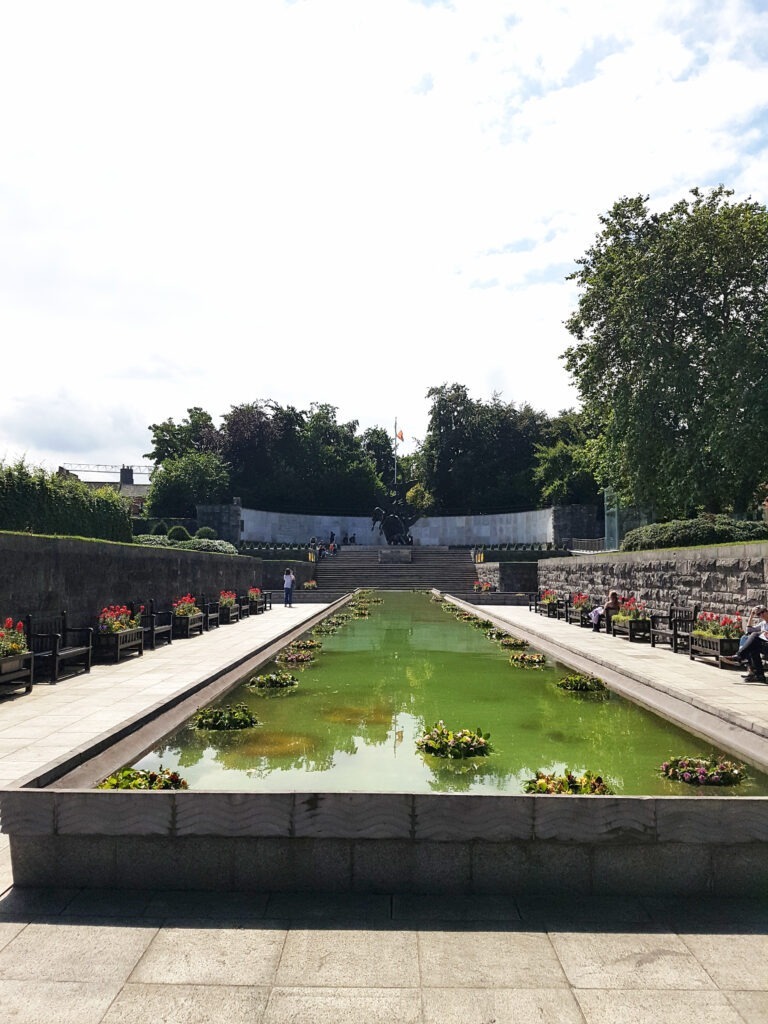
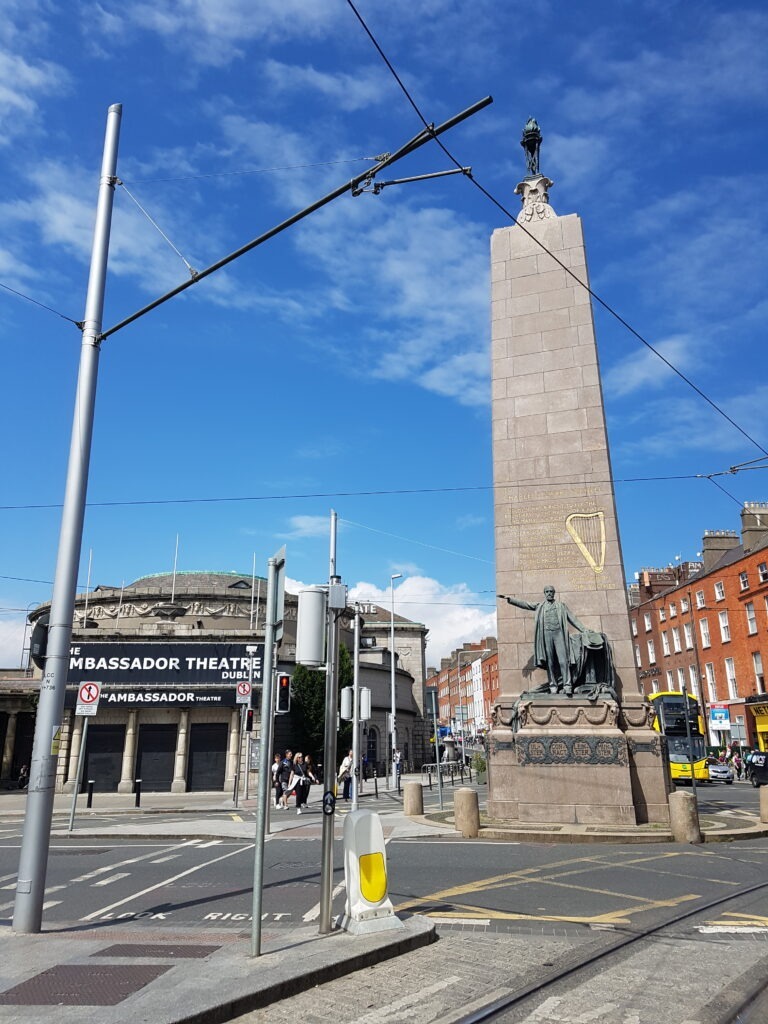
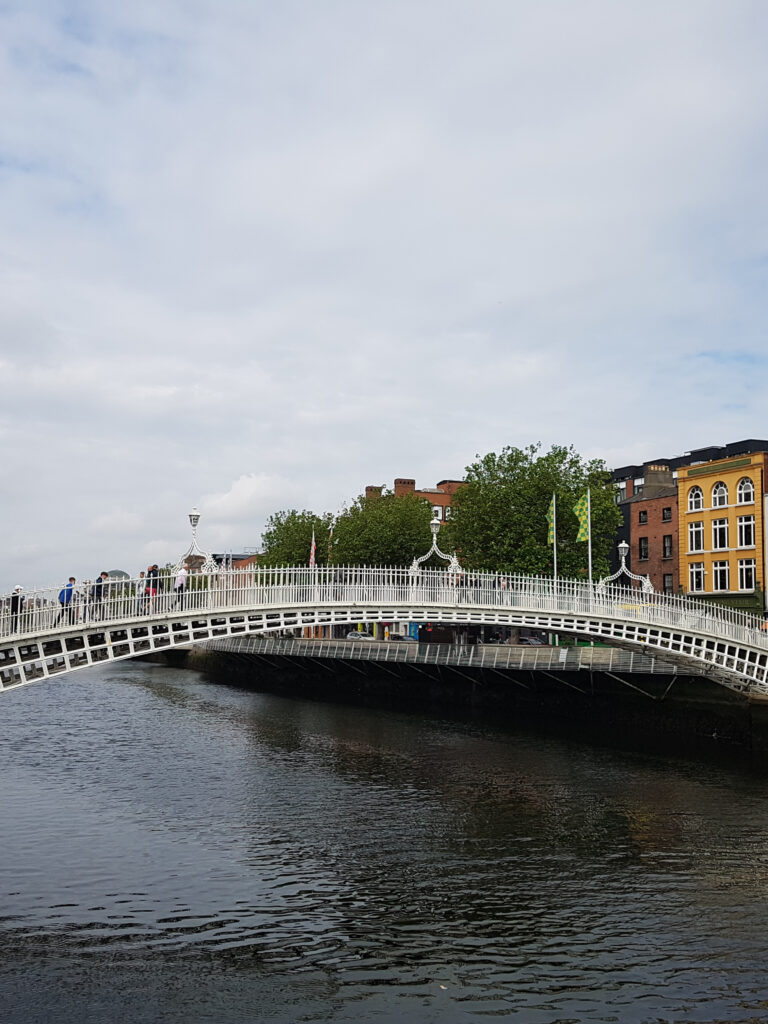
![{"type":"elementor","siteurl":"https://transling.pl/wp-json/","elements":[{"id":"4700679","elType":"widget","isInner":false,"isLocked":false,"settings":{"image":{"url":"https://transling.pl/wp-content/uploads/2024/07/Oscar-Wilde-scaled.jpg","id":2550,"size":"","alt":"Oscar Wilde","source":"library"},"pa_condition_repeater":[],"premium_tooltip_text":"Hi, I'm a global tooltip.","premium_tooltip_position":"top,bottom","image_size":"large","image_custom_dimension":{"width":"","height":""},"caption_source":"none","caption":"","link_to":"none","link":{"url":"","is_external":"","nofollow":"","custom_attributes":""},"open_lightbox":"default","align":"","align_tablet":"","align_mobile":"","width":{"unit":"%","size":"","sizes":[]},"width_tablet":{"unit":"%","size":"","sizes":[]},"width_mobile":{"unit":"%","size":"","sizes":[]},"space":{"unit":"%","size":"","sizes":[]},"space_tablet":{"unit":"%","size":"","sizes":[]},"space_mobile":{"unit":"%","size":"","sizes":[]},"height":{"unit":"px","size":"","sizes":[]},"height_tablet":{"unit":"px","size":"","sizes":[]},"height_mobile":{"unit":"px","size":"","sizes":[]},"object-fit":"","object-fit_tablet":"","object-fit_mobile":"","object-position":"center center","object-position_tablet":"","object-position_mobile":"","opacity":{"unit":"px","size":"","sizes":[]},"css_filters_css_filter":"","css_filters_blur":{"unit":"px","size":0,"sizes":[]},"css_filters_brightness":{"unit":"px","size":100,"sizes":[]},"css_filters_contrast":{"unit":"px","size":100,"sizes":[]},"css_filters_saturate":{"unit":"px","size":100,"sizes":[]},"css_filters_hue":{"unit":"px","size":0,"sizes":[]},"opacity_hover":{"unit":"px","size":"","sizes":[]},"css_filters_hover_css_filter":"","css_filters_hover_blur":{"unit":"px","size":0,"sizes":[]},"css_filters_hover_brightness":{"unit":"px","size":100,"sizes":[]},"css_filters_hover_contrast":{"unit":"px","size":100,"sizes":[]},"css_filters_hover_saturate":{"unit":"px","size":100,"sizes":[]},"css_filters_hover_hue":{"unit":"px","size":0,"sizes":[]},"background_hover_transition":{"unit":"px","size":"","sizes":[]},"hover_animation":"","image_border_border":"","image_border_width":{"unit":"px","top":"","right":"","bottom":"","left":"","isLinked":true},"image_border_width_tablet":{"unit":"px","top":"","right":"","bottom":"","left":"","isLinked":true},"image_border_width_mobile":{"unit":"px","top":"","right":"","bottom":"","left":"","isLinked":true},"image_border_color":"","image_border_radius":{"unit":"px","top":"","right":"","bottom":"","left":"","isLinked":true},"image_border_radius_tablet":{"unit":"px","top":"","right":"","bottom":"","left":"","isLinked":true},"image_border_radius_mobile":{"unit":"px","top":"","right":"","bottom":"","left":"","isLinked":true},"image_box_shadow_box_shadow_type":"","image_box_shadow_box_shadow":{"horizontal":0,"vertical":0,"blur":10,"spread":0,"color":"rgba(0,0,0,0.5)"},"caption_align":"","caption_align_tablet":"","caption_align_mobile":"","text_color":"","caption_background_color":"","caption_typography_typography":"","caption_typography_font_family":"","caption_typography_font_size":{"unit":"px","size":"","sizes":[]},"caption_typography_font_size_tablet":{"unit":"px","size":"","sizes":[]},"caption_typography_font_size_mobile":{"unit":"px","size":"","sizes":[]},"caption_typography_font_weight":"","caption_typography_text_transform":"","caption_typography_font_style":"","caption_typography_text_decoration":"","caption_typography_line_height":{"unit":"px","size":"","sizes":[]},"caption_typography_line_height_tablet":{"unit":"em","size":"","sizes":[]},"caption_typography_line_height_mobile":{"unit":"em","size":"","sizes":[]},"caption_typography_letter_spacing":{"unit":"px","size":"","sizes":[]},"caption_typography_letter_spacing_tablet":{"unit":"px","size":"","sizes":[]},"caption_typography_letter_spacing_mobile":{"unit":"px","size":"","sizes":[]},"caption_typography_word_spacing":{"unit":"px","size":"","sizes":[]},"caption_typography_word_spacing_tablet":{"unit":"em","size":"","sizes":[]},"caption_typography_word_spacing_mobile":{"unit":"em","size":"","sizes":[]},"caption_text_shadow_text_shadow_type":"","caption_text_shadow_text_shadow":{"horizontal":0,"vertical":0,"blur":10,"color":"rgba(0,0,0,0.3)"},"caption_space":{"unit":"px","size":"","sizes":[]},"caption_space_tablet":{"unit":"px","size":"","sizes":[]},"caption_space_mobile":{"unit":"px","size":"","sizes":[]},"_title":"","_margin":{"unit":"px","top":"","right":"","bottom":"","left":"","isLinked":true},"_margin_tablet":{"unit":"px","top":"","right":"","bottom":"","left":"","isLinked":true},"_margin_mobile":{"unit":"px","top":"","right":"","bottom":"","left":"","isLinked":true},"_padding":{"unit":"px","top":"","right":"","bottom":"","left":"","isLinked":true},"_padding_tablet":{"unit":"px","top":"","right":"","bottom":"","left":"","isLinked":true},"_padding_mobile":{"unit":"px","top":"","right":"","bottom":"","left":"","isLinked":true},"_element_width":"","_element_width_tablet":"","_element_width_mobile":"","_element_custom_width":{"unit":"%","size":"","sizes":[]},"_element_custom_width_tablet":{"unit":"px","size":"","sizes":[]},"_element_custom_width_mobile":{"unit":"px","size":"","sizes":[]},"_element_vertical_align":"","_element_vertical_align_tablet":"","_element_vertical_align_mobile":"","_position":"","_offset_orientation_h":"start","_offset_x":{"unit":"px","size":0,"sizes":[]},"_offset_x_tablet":{"unit":"px","size":"","sizes":[]},"_offset_x_mobile":{"unit":"px","size":"","sizes":[]},"_offset_x_end":{"unit":"px","size":0,"sizes":[]},"_offset_x_end_tablet":{"unit":"px","size":"","sizes":[]},"_offset_x_end_mobile":{"unit":"px","size":"","sizes":[]},"_offset_orientation_v":"start","_offset_y":{"unit":"px","size":0,"sizes":[]},"_offset_y_tablet":{"unit":"px","size":"","sizes":[]},"_offset_y_mobile":{"unit":"px","size":"","sizes":[]},"_offset_y_end":{"unit":"px","size":0,"sizes":[]},"_offset_y_end_tablet":{"unit":"px","size":"","sizes":[]},"_offset_y_end_mobile":{"unit":"px","size":"","sizes":[]},"_z_index":"","_z_index_tablet":"","_z_index_mobile":"","_element_id":"","_css_classes":"","pa_display_conditions_switcher":"","pa_display_action":"show","pa_display_when":"any","premium_fe_switcher":"","premium_fe_target":"","premium_fe_translate_switcher":"","premium_fe_Xtranslate":{"unit":"px","size":"","sizes":{"from":0,"to":5}},"premium_fe_Xtranslate_tablet":{"unit":"px","size":"","sizes":[]},"premium_fe_Xtranslate_mobile":{"unit":"px","size":"","sizes":[]},"premium_fe_Ytranslate":{"unit":"px","size":"","sizes":{"from":0,"to":5}},"premium_fe_Ytranslate_tablet":{"unit":"px","size":"","sizes":[]},"premium_fe_Ytranslate_mobile":{"unit":"px","size":"","sizes":[]},"premium_fe_trans_duration":{"unit":"px","size":1000,"sizes":[]},"premium_fe_trans_delay":{"unit":"px","size":"","sizes":[]},"premium_fe_rotate_switcher":"","premium_fe_Xrotate":{"unit":"deg","size":"","sizes":{"from":0,"to":45}},"premium_fe_Xrotate_tablet":{"unit":"px","size":"","sizes":[]},"premium_fe_Xrotate_mobile":{"unit":"px","size":"","sizes":[]},"premium_fe_Yrotate":{"unit":"deg","size":"","sizes":{"from":0,"to":45}},"premium_fe_Yrotate_tablet":{"unit":"px","size":"","sizes":[]},"premium_fe_Yrotate_mobile":{"unit":"px","size":"","sizes":[]},"premium_fe_Zrotate":{"unit":"deg","size":"","sizes":{"from":0,"to":45}},"premium_fe_Zrotate_tablet":{"unit":"px","size":"","sizes":[]},"premium_fe_Zrotate_mobile":{"unit":"px","size":"","sizes":[]},"premium_fe_rotate_duration":{"unit":"px","size":1000,"sizes":[]},"premium_fe_rotate_delay":{"unit":"px","size":"","sizes":[]},"premium_fe_scale_switcher":"","premium_fe_Xscale":{"unit":"px","size":"","sizes":{"from":1,"to":1.2}},"premium_fe_Xscale_tablet":{"unit":"px","size":"","sizes":[]},"premium_fe_Xscale_mobile":{"unit":"px","size":"","sizes":[]},"premium_fe_Yscale":{"unit":"px","size":"","sizes":{"from":1,"to":1.2}},"premium_fe_Yscale_tablet":{"unit":"px","size":"","sizes":[]},"premium_fe_Yscale_mobile":{"unit":"px","size":"","sizes":[]},"premium_fe_scale_duration":{"unit":"px","size":1000,"sizes":[]},"premium_fe_scale_delay":{"unit":"px","size":"","sizes":[]},"premium_fe_skew_switcher":"","premium_fe_Xskew":{"unit":"deg","size":"","sizes":{"from":0,"to":20}},"premium_fe_Xskew_tablet":{"unit":"px","size":"","sizes":[]},"premium_fe_Xskew_mobile":{"unit":"px","size":"","sizes":[]},"premium_fe_Yskew":{"unit":"deg","size":"","sizes":{"from":0,"to":20}},"premium_fe_Yskew_tablet":{"unit":"px","size":"","sizes":[]},"premium_fe_Yskew_mobile":{"unit":"px","size":"","sizes":[]},"premium_fe_skew_duration":{"unit":"px","size":1000,"sizes":[]},"premium_fe_skew_delay":{"unit":"px","size":"","sizes":[]},"premium_fe_opacity_switcher":"","premium_fe_bg_color_switcher":"","premium_fe_blur_switcher":"","premium_fe_contrast_switcher":"","premium_fe_gScale_switcher":"","premium_fe_hue_switcher":"","premium_fe_brightness_switcher":"","premium_fe_saturate_switcher":"","premium_fe_direction":"alternate","premium_fe_loop":"default","premium_fe_loop_number":3,"premium_fe_easing":"easeInOutSine","premium_fe_ease_step":5,"premium_fe_disable_safari":"","premium_tooltip_switcher":"","pa_tooltip_target":"","premium_tooltip_type":"text","premium_tooltip_icon_switcher":"","premium_tooltip_icon":{"value":"fas fa-star","library":"fa-solid"},"premium_tooltip_lottie_url":"","premium_tooltip_lottie_loop":"true","premium_tooltip_lottie_reverse":"","hide_tooltip_on":[],"premium_tooltip_text_color":"","premium_tooltip_text_typo_typography":"","premium_tooltip_text_typo_font_family":"","premium_tooltip_text_typo_font_size":{"unit":"px","size":"","sizes":[]},"premium_tooltip_text_typo_font_size_tablet":{"unit":"px","size":"","sizes":[]},"premium_tooltip_text_typo_font_size_mobile":{"unit":"px","size":"","sizes":[]},"premium_tooltip_text_typo_font_weight":"","premium_tooltip_text_typo_text_transform":"","premium_tooltip_text_typo_font_style":"","premium_tooltip_text_typo_text_decoration":"","premium_tooltip_text_typo_line_height":{"unit":"px","size":"","sizes":[]},"premium_tooltip_text_typo_line_height_tablet":{"unit":"em","size":"","sizes":[]},"premium_tooltip_text_typo_line_height_mobile":{"unit":"em","size":"","sizes":[]},"premium_tooltip_text_typo_letter_spacing":{"unit":"px","size":"","sizes":[]},"premium_tooltip_text_typo_letter_spacing_tablet":{"unit":"px","size":"","sizes":[]},"premium_tooltip_text_typo_letter_spacing_mobile":{"unit":"px","size":"","sizes":[]},"premium_tooltip_text_typo_word_spacing":{"unit":"px","size":"","sizes":[]},"premium_tooltip_text_typo_word_spacing_tablet":{"unit":"em","size":"","sizes":[]},"premium_tooltip_text_typo_word_spacing_mobile":{"unit":"em","size":"","sizes":[]},"premium_tooltip_text_shadow_text_shadow_type":"","premium_tooltip_text_shadow_text_shadow":{"horizontal":0,"vertical":0,"blur":10,"color":"rgba(0,0,0,0.3)"},"premium_tooltip_icon_color":"","premium_tooltip_icon_size":{"unit":"px","size":"","sizes":[]},"premium_tooltip_icon_size_tablet":{"unit":"px","size":"","sizes":[]},"premium_tooltip_icon_size_mobile":{"unit":"px","size":"","sizes":[]},"premium_tooltip_icon_shadow_text_shadow_type":"","premium_tooltip_icon_shadow_text_shadow":{"horizontal":0,"vertical":0,"blur":10,"color":"rgba(0,0,0,0.3)"},"premium_tooltip_img_size":{"unit":"px","size":100,"sizes":[]},"premium_tooltip_img_size_tablet":{"unit":"px","size":"","sizes":[]},"premium_tooltip_img_size_mobile":{"unit":"px","size":"","sizes":[]},"premium_tooltip_img_fit":"cover","premium_tooltip_img_fit_tablet":"","premium_tooltip_img_fit_mobile":"","premium_tooltip_container_bg_background":"","premium_tooltip_container_bg_color":"","premium_tooltip_container_bg_color_stop":{"unit":"%","size":0,"sizes":[]},"premium_tooltip_container_bg_color_stop_tablet":{"unit":"%"},"premium_tooltip_container_bg_color_stop_mobile":{"unit":"%"},"premium_tooltip_container_bg_color_b":"#f2295b","premium_tooltip_container_bg_color_b_stop":{"unit":"%","size":100,"sizes":[]},"premium_tooltip_container_bg_color_b_stop_tablet":{"unit":"%"},"premium_tooltip_container_bg_color_b_stop_mobile":{"unit":"%"},"premium_tooltip_container_bg_gradient_type":"linear","premium_tooltip_container_bg_gradient_angle":{"unit":"deg","size":180,"sizes":[]},"premium_tooltip_container_bg_gradient_angle_tablet":{"unit":"deg"},"premium_tooltip_container_bg_gradient_angle_mobile":{"unit":"deg"},"premium_tooltip_container_bg_gradient_position":"center center","premium_tooltip_container_bg_gradient_position_tablet":"","premium_tooltip_container_bg_gradient_position_mobile":"","premium_tooltip_container_bg_image":{"url":"","id":"","size":""},"premium_tooltip_container_bg_image_tablet":{"url":"","id":"","size":""},"premium_tooltip_container_bg_image_mobile":{"url":"","id":"","size":""},"premium_tooltip_container_bg_position":"","premium_tooltip_container_bg_position_tablet":"","premium_tooltip_container_bg_position_mobile":"","premium_tooltip_container_bg_xpos":{"unit":"px","size":0,"sizes":[]},"premium_tooltip_container_bg_xpos_tablet":{"unit":"px","size":0,"sizes":[]},"premium_tooltip_container_bg_xpos_mobile":{"unit":"px","size":0,"sizes":[]},"premium_tooltip_container_bg_ypos":{"unit":"px","size":0,"sizes":[]},"premium_tooltip_container_bg_ypos_tablet":{"unit":"px","size":0,"sizes":[]},"premium_tooltip_container_bg_ypos_mobile":{"unit":"px","size":0,"sizes":[]},"premium_tooltip_container_bg_attachment":"","premium_tooltip_container_bg_repeat":"","premium_tooltip_container_bg_repeat_tablet":"","premium_tooltip_container_bg_repeat_mobile":"","premium_tooltip_container_bg_size":"","premium_tooltip_container_bg_size_tablet":"","premium_tooltip_container_bg_size_mobile":"","premium_tooltip_container_bg_bg_width":{"unit":"%","size":100,"sizes":[]},"premium_tooltip_container_bg_bg_width_tablet":{"unit":"px","size":"","sizes":[]},"premium_tooltip_container_bg_bg_width_mobile":{"unit":"px","size":"","sizes":[]},"premium_tooltip_container_bg_video_link":"","premium_tooltip_container_bg_video_start":"","premium_tooltip_container_bg_video_end":"","premium_tooltip_container_bg_play_once":"","premium_tooltip_container_bg_play_on_mobile":"","premium_tooltip_container_bg_privacy_mode":"","premium_tooltip_container_bg_video_fallback":{"url":"","id":"","size":""},"premium_tooltip_container_bg_slideshow_gallery":[],"premium_tooltip_container_bg_slideshow_loop":"yes","premium_tooltip_container_bg_slideshow_slide_duration":5000,"premium_tooltip_container_bg_slideshow_slide_transition":"fade","premium_tooltip_container_bg_slideshow_transition_duration":500,"premium_tooltip_container_bg_slideshow_background_size":"","premium_tooltip_container_bg_slideshow_background_size_tablet":"","premium_tooltip_container_bg_slideshow_background_size_mobile":"","premium_tooltip_container_bg_slideshow_background_position":"","premium_tooltip_container_bg_slideshow_background_position_tablet":"","premium_tooltip_container_bg_slideshow_background_position_mobile":"","premium_tooltip_container_bg_slideshow_lazyload":"","premium_tooltip_container_bg_slideshow_ken_burns":"","premium_tooltip_container_bg_slideshow_ken_burns_zoom_direction":"in","premium_tooltip_container_border_border":"","premium_tooltip_container_border_width":{"unit":"px","top":"","right":"","bottom":"","left":"","isLinked":true},"premium_tooltip_container_border_width_tablet":{"unit":"px","top":"","right":"","bottom":"","left":"","isLinked":true},"premium_tooltip_container_border_width_mobile":{"unit":"px","top":"","right":"","bottom":"","left":"","isLinked":true},"premium_tooltip_container_border_color":"","premium_tooltip_container_border_radius":{"unit":"px","size":"","sizes":[]},"premium_tooltip_container_box_shadow_box_shadow_type":"","premium_tooltip_container_box_shadow_box_shadow":{"horizontal":0,"vertical":0,"blur":10,"spread":0,"color":"rgba(0,0,0,0.5)"},"premium_tooltip_container_box_shadow_box_shadow_position":" ","premium_tooltip_container_padding":{"unit":"px","top":"","right":"","bottom":"","left":"","isLinked":true},"premium_tooltip_container_padding_tablet":{"unit":"px","top":"","right":"","bottom":"","left":"","isLinked":true},"premium_tooltip_container_padding_mobile":{"unit":"px","top":"","right":"","bottom":"","left":"","isLinked":true},"premium_tooltip_arrow_color":"","premium_tooltip_mouse_follow":"","premium_tooltip_interactive":"yes","premium_tooltip_arrow":"","premium_tooltip_trigger":"hover","premium_tooltip_distance_position":6,"premium_tooltip_min_width":{"unit":"px","size":"","sizes":[]},"premium_tooltip_min_width_tablet":{"unit":"px","size":"","sizes":[]},"premium_tooltip_min_width_mobile":{"unit":"px","size":"","sizes":[]},"premium_tooltip_max_width":{"unit":"px","size":"","sizes":[]},"premium_tooltip_max_width_tablet":{"unit":"px","size":"","sizes":[]},"premium_tooltip_max_width_mobile":{"unit":"px","size":"","sizes":[]},"premium_tooltip_height":{"unit":"px","size":"","sizes":[]},"premium_tooltip_height_tablet":{"unit":"px","size":"","sizes":[]},"premium_tooltip_height_mobile":{"unit":"px","size":"","sizes":[]},"premium_tooltip_anime":"fade","premium_tooltip_anime_dur":350,"premium_tooltip_delay":10,"pa_tooltip_zindex":"","premium_wrapper_link_selection":"url","premium_wrapper_link":{"url":"","is_external":"","nofollow":"","custom_attributes":""},"premium_wrapper_existing_link":"","_animation":"","_animation_tablet":"","_animation_mobile":"","animation_duration":"","_animation_delay":"","_transform_rotate_popover":"","_transform_rotateZ_effect":{"unit":"px","size":"","sizes":[]},"_transform_rotateZ_effect_tablet":{"unit":"deg","size":"","sizes":[]},"_transform_rotateZ_effect_mobile":{"unit":"deg","size":"","sizes":[]},"_transform_rotate_3d":"","_transform_rotateX_effect":{"unit":"px","size":"","sizes":[]},"_transform_rotateX_effect_tablet":{"unit":"deg","size":"","sizes":[]},"_transform_rotateX_effect_mobile":{"unit":"deg","size":"","sizes":[]},"_transform_rotateY_effect":{"unit":"px","size":"","sizes":[]},"_transform_rotateY_effect_tablet":{"unit":"deg","size":"","sizes":[]},"_transform_rotateY_effect_mobile":{"unit":"deg","size":"","sizes":[]},"_transform_perspective_effect":{"unit":"px","size":"","sizes":[]},"_transform_perspective_effect_tablet":{"unit":"px","size":"","sizes":[]},"_transform_perspective_effect_mobile":{"unit":"px","size":"","sizes":[]},"_transform_translate_popover":"","_transform_translateX_effect":{"unit":"px","size":"","sizes":[]},"_transform_translateX_effect_tablet":{"unit":"px","size":"","sizes":[]},"_transform_translateX_effect_mobile":{"unit":"px","size":"","sizes":[]},"_transform_translateY_effect":{"unit":"px","size":"","sizes":[]},"_transform_translateY_effect_tablet":{"unit":"px","size":"","sizes":[]},"_transform_translateY_effect_mobile":{"unit":"px","size":"","sizes":[]},"_transform_scale_popover":"","_transform_keep_proportions":"yes","_transform_scale_effect":{"unit":"px","size":"","sizes":[]},"_transform_scale_effect_tablet":{"unit":"px","size":"","sizes":[]},"_transform_scale_effect_mobile":{"unit":"px","size":"","sizes":[]},"_transform_scaleX_effect":{"unit":"px","size":"","sizes":[]},"_transform_scaleX_effect_tablet":{"unit":"px","size":"","sizes":[]},"_transform_scaleX_effect_mobile":{"unit":"px","size":"","sizes":[]},"_transform_scaleY_effect":{"unit":"px","size":"","sizes":[]},"_transform_scaleY_effect_tablet":{"unit":"px","size":"","sizes":[]},"_transform_scaleY_effect_mobile":{"unit":"px","size":"","sizes":[]},"_transform_skew_popover":"","_transform_skewX_effect":{"unit":"px","size":"","sizes":[]},"_transform_skewX_effect_tablet":{"unit":"deg","size":"","sizes":[]},"_transform_skewX_effect_mobile":{"unit":"deg","size":"","sizes":[]},"_transform_skewY_effect":{"unit":"px","size":"","sizes":[]},"_transform_skewY_effect_tablet":{"unit":"deg","size":"","sizes":[]},"_transform_skewY_effect_mobile":{"unit":"deg","size":"","sizes":[]},"_transform_flipX_effect":"","_transform_flipY_effect":"","_transform_rotate_popover_hover":"","_transform_rotateZ_effect_hover":{"unit":"px","size":"","sizes":[]},"_transform_rotateZ_effect_hover_tablet":{"unit":"deg","size":"","sizes":[]},"_transform_rotateZ_effect_hover_mobile":{"unit":"deg","size":"","sizes":[]},"_transform_rotate_3d_hover":"","_transform_rotateX_effect_hover":{"unit":"px","size":"","sizes":[]},"_transform_rotateX_effect_hover_tablet":{"unit":"deg","size":"","sizes":[]},"_transform_rotateX_effect_hover_mobile":{"unit":"deg","size":"","sizes":[]},"_transform_rotateY_effect_hover":{"unit":"px","size":"","sizes":[]},"_transform_rotateY_effect_hover_tablet":{"unit":"deg","size":"","sizes":[]},"_transform_rotateY_effect_hover_mobile":{"unit":"deg","size":"","sizes":[]},"_transform_perspective_effect_hover":{"unit":"px","size":"","sizes":[]},"_transform_perspective_effect_hover_tablet":{"unit":"px","size":"","sizes":[]},"_transform_perspective_effect_hover_mobile":{"unit":"px","size":"","sizes":[]},"_transform_translate_popover_hover":"","_transform_translateX_effect_hover":{"unit":"px","size":"","sizes":[]},"_transform_translateX_effect_hover_tablet":{"unit":"px","size":"","sizes":[]},"_transform_translateX_effect_hover_mobile":{"unit":"px","size":"","sizes":[]},"_transform_translateY_effect_hover":{"unit":"px","size":"","sizes":[]},"_transform_translateY_effect_hover_tablet":{"unit":"px","size":"","sizes":[]},"_transform_translateY_effect_hover_mobile":{"unit":"px","size":"","sizes":[]},"_transform_scale_popover_hover":"","_transform_keep_proportions_hover":"yes","_transform_scale_effect_hover":{"unit":"px","size":"","sizes":[]},"_transform_scale_effect_hover_tablet":{"unit":"px","size":"","sizes":[]},"_transform_scale_effect_hover_mobile":{"unit":"px","size":"","sizes":[]},"_transform_scaleX_effect_hover":{"unit":"px","size":"","sizes":[]},"_transform_scaleX_effect_hover_tablet":{"unit":"px","size":"","sizes":[]},"_transform_scaleX_effect_hover_mobile":{"unit":"px","size":"","sizes":[]},"_transform_scaleY_effect_hover":{"unit":"px","size":"","sizes":[]},"_transform_scaleY_effect_hover_tablet":{"unit":"px","size":"","sizes":[]},"_transform_scaleY_effect_hover_mobile":{"unit":"px","size":"","sizes":[]},"_transform_skew_popover_hover":"","_transform_skewX_effect_hover":{"unit":"px","size":"","sizes":[]},"_transform_skewX_effect_hover_tablet":{"unit":"deg","size":"","sizes":[]},"_transform_skewX_effect_hover_mobile":{"unit":"deg","size":"","sizes":[]},"_transform_skewY_effect_hover":{"unit":"px","size":"","sizes":[]},"_transform_skewY_effect_hover_tablet":{"unit":"deg","size":"","sizes":[]},"_transform_skewY_effect_hover_mobile":{"unit":"deg","size":"","sizes":[]},"_transform_flipX_effect_hover":"","_transform_flipY_effect_hover":"","_transform_transition_hover":{"unit":"px","size":"","sizes":[]},"motion_fx_transform_x_anchor_point":"","motion_fx_transform_x_anchor_point_tablet":"","motion_fx_transform_x_anchor_point_mobile":"","motion_fx_transform_y_anchor_point":"","motion_fx_transform_y_anchor_point_tablet":"","motion_fx_transform_y_anchor_point_mobile":"","_background_background":"","_background_color":"","_background_color_stop":{"unit":"%","size":0,"sizes":[]},"_background_color_stop_tablet":{"unit":"%"},"_background_color_stop_mobile":{"unit":"%"},"_background_color_b":"#f2295b","_background_color_b_stop":{"unit":"%","size":100,"sizes":[]},"_background_color_b_stop_tablet":{"unit":"%"},"_background_color_b_stop_mobile":{"unit":"%"},"_background_gradient_type":"linear","_background_gradient_angle":{"unit":"deg","size":180,"sizes":[]},"_background_gradient_angle_tablet":{"unit":"deg"},"_background_gradient_angle_mobile":{"unit":"deg"},"_background_gradient_position":"center center","_background_gradient_position_tablet":"","_background_gradient_position_mobile":"","_background_image":{"url":"","id":"","size":""},"_background_image_tablet":{"url":"","id":"","size":""},"_background_image_mobile":{"url":"","id":"","size":""},"_background_position":"","_background_position_tablet":"","_background_position_mobile":"","_background_xpos":{"unit":"px","size":0,"sizes":[]},"_background_xpos_tablet":{"unit":"px","size":0,"sizes":[]},"_background_xpos_mobile":{"unit":"px","size":0,"sizes":[]},"_background_ypos":{"unit":"px","size":0,"sizes":[]},"_background_ypos_tablet":{"unit":"px","size":0,"sizes":[]},"_background_ypos_mobile":{"unit":"px","size":0,"sizes":[]},"_background_attachment":"","_background_repeat":"","_background_repeat_tablet":"","_background_repeat_mobile":"","_background_size":"","_background_size_tablet":"","_background_size_mobile":"","_background_bg_width":{"unit":"%","size":100,"sizes":[]},"_background_bg_width_tablet":{"unit":"px","size":"","sizes":[]},"_background_bg_width_mobile":{"unit":"px","size":"","sizes":[]},"_background_video_link":"","_background_video_start":"","_background_video_end":"","_background_play_once":"","_background_play_on_mobile":"","_background_privacy_mode":"","_background_video_fallback":{"url":"","id":"","size":""},"_background_slideshow_gallery":[],"_background_slideshow_loop":"yes","_background_slideshow_slide_duration":5000,"_background_slideshow_slide_transition":"fade","_background_slideshow_transition_duration":500,"_background_slideshow_background_size":"","_background_slideshow_background_size_tablet":"","_background_slideshow_background_size_mobile":"","_background_slideshow_background_position":"","_background_slideshow_background_position_tablet":"","_background_slideshow_background_position_mobile":"","_background_slideshow_lazyload":"","_background_slideshow_ken_burns":"","_background_slideshow_ken_burns_zoom_direction":"in","_background_hover_background":"","_background_hover_color":"","_background_hover_color_stop":{"unit":"%","size":0,"sizes":[]},"_background_hover_color_stop_tablet":{"unit":"%"},"_background_hover_color_stop_mobile":{"unit":"%"},"_background_hover_color_b":"#f2295b","_background_hover_color_b_stop":{"unit":"%","size":100,"sizes":[]},"_background_hover_color_b_stop_tablet":{"unit":"%"},"_background_hover_color_b_stop_mobile":{"unit":"%"},"_background_hover_gradient_type":"linear","_background_hover_gradient_angle":{"unit":"deg","size":180,"sizes":[]},"_background_hover_gradient_angle_tablet":{"unit":"deg"},"_background_hover_gradient_angle_mobile":{"unit":"deg"},"_background_hover_gradient_position":"center center","_background_hover_gradient_position_tablet":"","_background_hover_gradient_position_mobile":"","_background_hover_image":{"url":"","id":"","size":""},"_background_hover_image_tablet":{"url":"","id":"","size":""},"_background_hover_image_mobile":{"url":"","id":"","size":""},"_background_hover_position":"","_background_hover_position_tablet":"","_background_hover_position_mobile":"","_background_hover_xpos":{"unit":"px","size":0,"sizes":[]},"_background_hover_xpos_tablet":{"unit":"px","size":0,"sizes":[]},"_background_hover_xpos_mobile":{"unit":"px","size":0,"sizes":[]},"_background_hover_ypos":{"unit":"px","size":0,"sizes":[]},"_background_hover_ypos_tablet":{"unit":"px","size":0,"sizes":[]},"_background_hover_ypos_mobile":{"unit":"px","size":0,"sizes":[]},"_background_hover_attachment":"","_background_hover_repeat":"","_background_hover_repeat_tablet":"","_background_hover_repeat_mobile":"","_background_hover_size":"","_background_hover_size_tablet":"","_background_hover_size_mobile":"","_background_hover_bg_width":{"unit":"%","size":100,"sizes":[]},"_background_hover_bg_width_tablet":{"unit":"px","size":"","sizes":[]},"_background_hover_bg_width_mobile":{"unit":"px","size":"","sizes":[]},"_background_hover_video_link":"","_background_hover_video_start":"","_background_hover_video_end":"","_background_hover_play_once":"","_background_hover_play_on_mobile":"","_background_hover_privacy_mode":"","_background_hover_video_fallback":{"url":"","id":"","size":""},"_background_hover_slideshow_gallery":[],"_background_hover_slideshow_loop":"yes","_background_hover_slideshow_slide_duration":5000,"_background_hover_slideshow_slide_transition":"fade","_background_hover_slideshow_transition_duration":500,"_background_hover_slideshow_background_size":"","_background_hover_slideshow_background_size_tablet":"","_background_hover_slideshow_background_size_mobile":"","_background_hover_slideshow_background_position":"","_background_hover_slideshow_background_position_tablet":"","_background_hover_slideshow_background_position_mobile":"","_background_hover_slideshow_lazyload":"","_background_hover_slideshow_ken_burns":"","_background_hover_slideshow_ken_burns_zoom_direction":"in","_background_hover_transition":{"unit":"px","size":"","sizes":[]},"_border_border":"","_border_width":{"unit":"px","top":"","right":"","bottom":"","left":"","isLinked":true},"_border_width_tablet":{"unit":"px","top":"","right":"","bottom":"","left":"","isLinked":true},"_border_width_mobile":{"unit":"px","top":"","right":"","bottom":"","left":"","isLinked":true},"_border_color":"","_border_radius":{"unit":"px","top":"","right":"","bottom":"","left":"","isLinked":true},"_border_radius_tablet":{"unit":"px","top":"","right":"","bottom":"","left":"","isLinked":true},"_border_radius_mobile":{"unit":"px","top":"","right":"","bottom":"","left":"","isLinked":true},"_box_shadow_box_shadow_type":"","_box_shadow_box_shadow":{"horizontal":0,"vertical":0,"blur":10,"spread":0,"color":"rgba(0,0,0,0.5)"},"_box_shadow_box_shadow_position":" ","_border_hover_border":"","_border_hover_width":{"unit":"px","top":"","right":"","bottom":"","left":"","isLinked":true},"_border_hover_width_tablet":{"unit":"px","top":"","right":"","bottom":"","left":"","isLinked":true},"_border_hover_width_mobile":{"unit":"px","top":"","right":"","bottom":"","left":"","isLinked":true},"_border_hover_color":"","_border_radius_hover":{"unit":"px","top":"","right":"","bottom":"","left":"","isLinked":true},"_border_radius_hover_tablet":{"unit":"px","top":"","right":"","bottom":"","left":"","isLinked":true},"_border_radius_hover_mobile":{"unit":"px","top":"","right":"","bottom":"","left":"","isLinked":true},"_box_shadow_hover_box_shadow_type":"","_box_shadow_hover_box_shadow":{"horizontal":0,"vertical":0,"blur":10,"spread":0,"color":"rgba(0,0,0,0.5)"},"_box_shadow_hover_box_shadow_position":" ","_border_hover_transition":{"unit":"px","size":"","sizes":[]},"_mask_switch":"","_mask_shape":"circle","_mask_image":{"url":"","id":"","size":""},"_mask_notice":"","_mask_size":"contain","_mask_size_tablet":"","_mask_size_mobile":"","_mask_size_scale":{"unit":"%","size":100,"sizes":[]},"_mask_size_scale_tablet":{"unit":"px","size":"","sizes":[]},"_mask_size_scale_mobile":{"unit":"px","size":"","sizes":[]},"_mask_position":"center center","_mask_position_tablet":"","_mask_position_mobile":"","_mask_position_x":{"unit":"%","size":0,"sizes":[]},"_mask_position_x_tablet":{"unit":"px","size":"","sizes":[]},"_mask_position_x_mobile":{"unit":"px","size":"","sizes":[]},"_mask_position_y":{"unit":"%","size":0,"sizes":[]},"_mask_position_y_tablet":{"unit":"px","size":"","sizes":[]},"_mask_position_y_mobile":{"unit":"px","size":"","sizes":[]},"_mask_repeat":"no-repeat","_mask_repeat_tablet":"","_mask_repeat_mobile":"","hide_desktop":"","hide_tablet":"","hide_mobile":""},"defaultEditSettings":{"defaultEditRoute":"content"},"elements":[],"widgetType":"image","htmlCache":"\t\t\n\t\t\t\t\t\t\t\t\t\t\t\t\t](https://transling.pl/wp-content/uploads/2024/07/St-Patricks-Cathedral-768x1024.jpg)
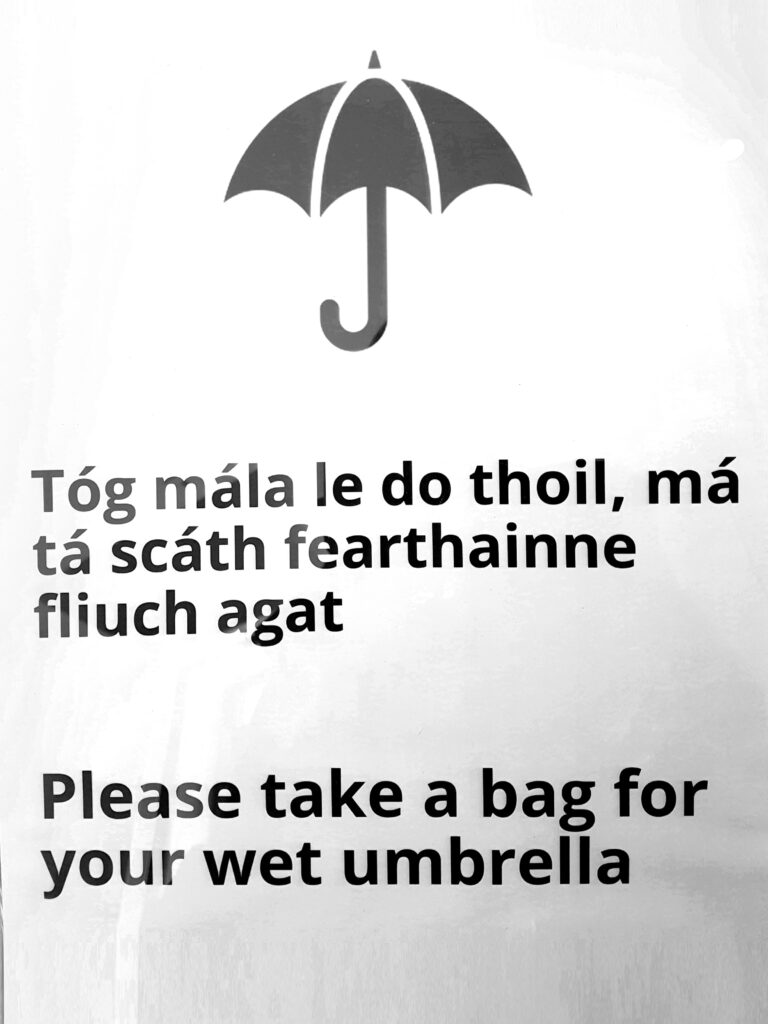
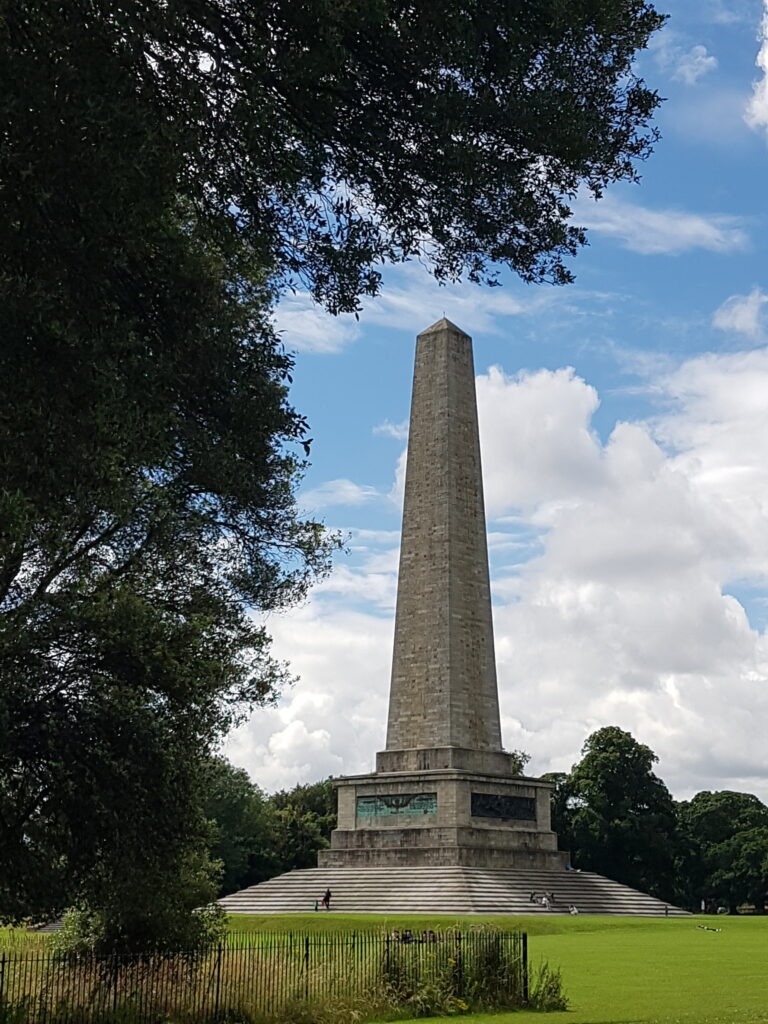
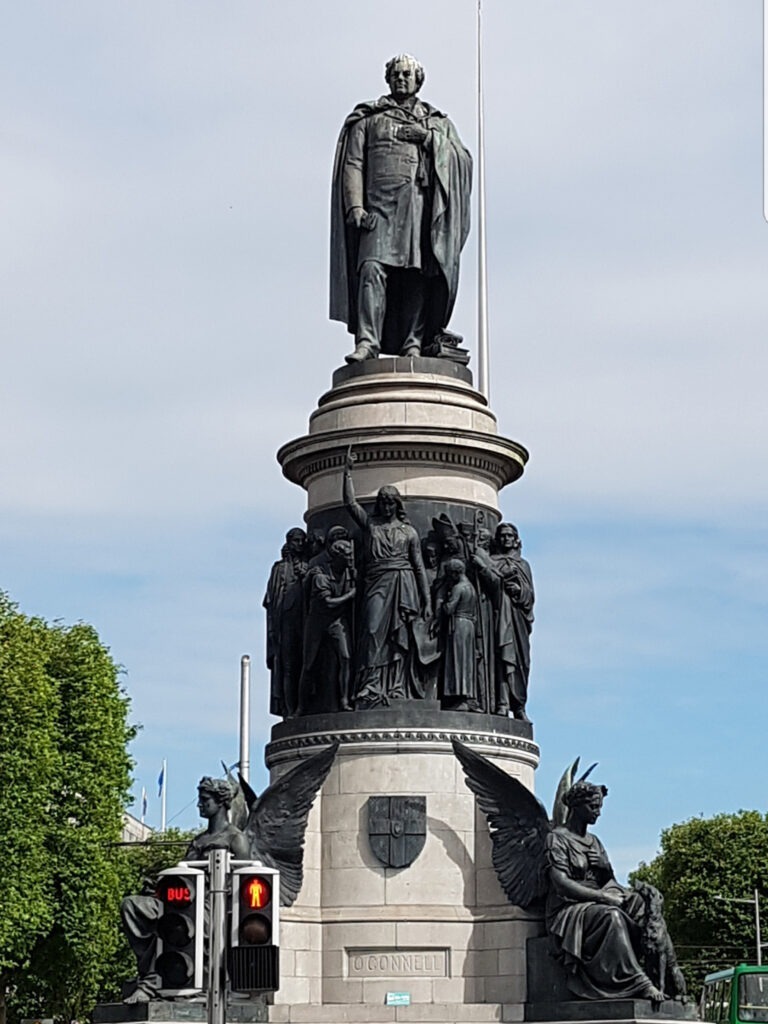
Pozostając w kręgu turystyczno-podróżniczo-wakacyjnym, kolejny anglojęzyczny kraj godny odwiedzenia to Irlandia z jej uroczą stolicą czyli Dublinem. To właśnie Dublin jest tematem na lipiec.
Moje pierwsze zetknięcie z irlandzkim klimatem, krajobrazem, kulturą i atrakcjami miało miejsce stosunkowo niedawno bo w 2022 roku i to można powiedzieć przez przypadek, ponieważ zamiast pobytu w brytyjskim Manchesterze zostałam przekierowana do oddziału w Dublinie. Muszę przyznać, że efekt przypadku przerodził się w swego rodzaju fascynację irlandzką rzeczywistością do tego stopnia, iż rok później również trafiłam to stolicy Irlandii, ojczyzny Oscara Wilde’a czy Bono z U2. W tym roku również nie mogło być inaczej, znów odwiedziłam dublińskie zakątki chłonąc irlandzki klimat wszelkimi zmysłami.
Lot z Krakowa do Dublina trwa ok. 2.5 godziny. Na lotnisku w Dublinie jesteśmy witani w dwóch językach tj. w angielskim oraz irlandzkim, który jest językiem narodowym lecz używany przez zdecydowaną mniejszość Irlandczyków. Język ten należy do grupy języków celtyckich i jedynie ok. 4 % ludności irlandzkiej deklaruję znajomość tego języka wyniesioną głównie z zajęć szkolnych. Oba języki można spotkać w większości miejsc publicznych zarówno w formie pisanej jak i mówionej, np. w autobusach pierwszy komunikat jest w wersji angielskiej, drugi w irlandzkiej.
W przeciwieństwie do większości stolic i innych większych miast europejskich, Dublin jest stosunkowo niewielkim miastem a jego powierzchnia liczy zaledwie 117,8 km² czyli jest niemal 3 razy mniejszy od Krakowa. Można zatem w jeden weekend zwiedzić niemal wszystkie najważniejsze i najciekawsze zakątki irlandzkiej stolicy.
Poniżej lista najbardziej znanych miejsc w Dublinie wartych odwiedzenia:
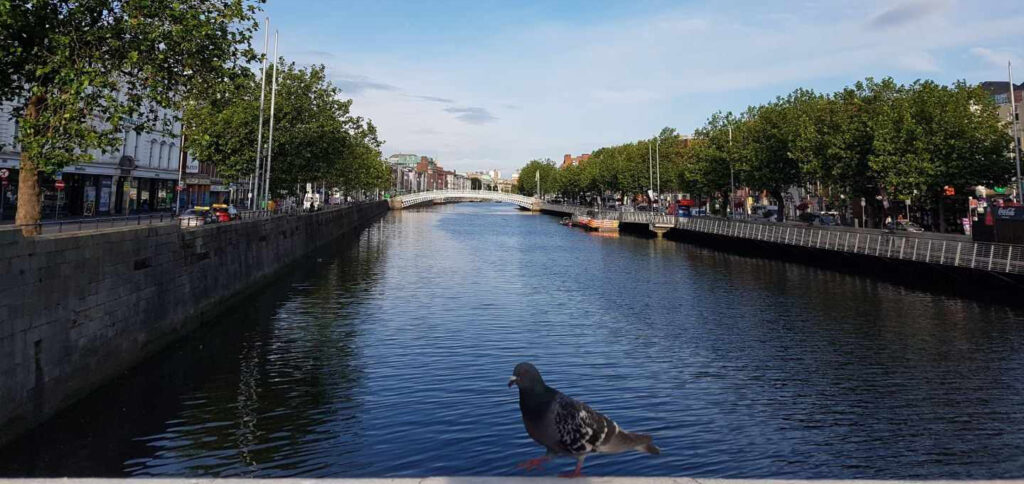
Staying in the tourist-travel-holiday mode, another English-speaking country worth visiting is Ireland with its charming capital, Dublin. It is Dublin which is the theme for July.
My first encounter with the Irish climate, landscape, culture and attractions was relatively not so long ago, in 2022, and I must admit it was by pure accident, because instead of going to Manchester, in the UK, I was redirected to the branch in Dublin. Frankly speaking, the effect of chance turned into a kind of fascination with Irish reality, to such an extent that a year later I also found myself in the capital of Ireland, the homeland of Oscar Wilde and Bono from U2 among others. This year it couldn’t be any different and once again I visited Dublin’s corners, absorbing the Irish climate with all my senses.
The flight from Krakow to Dublin takes about 2.5 hours. At the Dublin airport we are welcomed in two languages, i.e. English and Irish, which is the national language but used by a vast minority of Irish people. This language belongs to the group of Celtic languages and only about 4% of the Irish population declare their knowledge of this language, mainly acquired at school. Both languages can be found in most public places, both in written and spoken form, e.g. on buses, the first message is in English, the second in Irish.
Unlike most capitals and other larger European cities, Dublin is a relatively small city and its area is only 117.8 km², which is almost 3 times smaller than Krakow. Therefore, you can visit almost all the most important and interesting corners of the Irish capital during one weekend.
Below is a list of the most famous places in Dublin worth visiting:
MY TOP 15
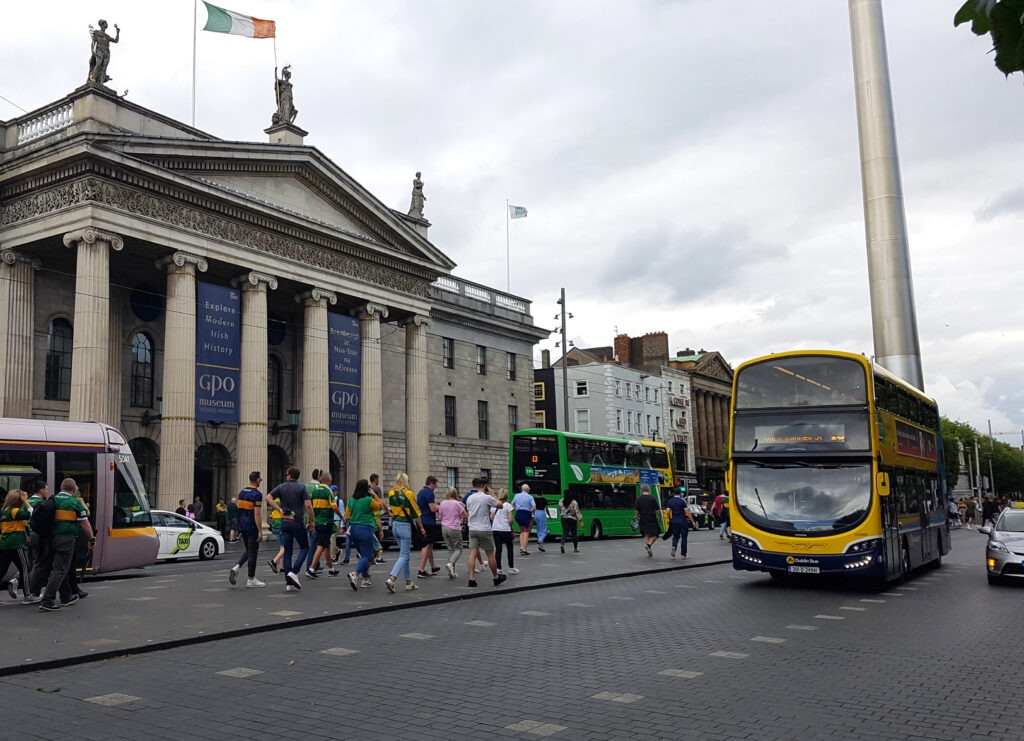
1. O’Connell Street – To centralny punkt miasta zatem zwiedzanie dobrze rozpocząć właśnie tutaj na O’Connell Street, która rozciąga się od mostu O’Connell Bridge do Parnell Street. O’Connell Street i jej okolice to jedne z głównych miejsc handlowych w Dublinie z licznymi sklepami, centrami handlowymi, restauracjami, kawiarniami itp. Jest to także węzeł komunikacyjny wszystkich autobusów miejskich w Dublinie ale również autokarów krajowych. Na O’Connell Street dojedziemy bezpośrednio autokarem z lotniska a podróż trwa jedynie ok. 30-35 min. To właśnie na O’Connell Street znajduje się wiele rzeźb i pomników, w tym podobno jedna z najwyższych rzeźb na świecie – The Spire of Dublin. Jest to 120-metrowej wysokości monument przypominający igłę, zaprojektowany w 2003 roku i umieszczony w miejscu, w którym dawniej stała Kolumna Nelsona i która została zniszczona wiele lat wcześniej przez Irlandzką Armię Republikańską. Innym ważnym zabytkiem, który warto zobaczyć przy O’Connell Street jest pomnik Daniela O’Connella, XIX-wiecznego przywódcy nacjonalistów irlandzkich. Jednym z najbardziej charakterystycznych i okazałych budynków na O’Connell Street jest budynek Poczty Głównej (GPO = General Post Office), zaprojektowany w 1818 roku. To właśnie w tym miejscu ogłoszono Proklamację Republiki. Z tych powyższych względów O’Connell Street to obowiązkowy punkt dla wszystkich turystów odwiedzających Dublin.
1. O’Connell Street – It’s a good idea to start your tour of the city from O’Connell Street, located in the very heart of Dublin, stretching from O’Connell Bridge to Parnell Street. O’Connell Street and its surrounding area are one of the main shopping areas in Dublin with numerous shops, shopping malls, restaurants, cafes etc. It is also the hub for all Dublin city buses as well as national coaches. We can get to O’Connell Street directly by bus from the airport and the journey takes about 30-35 minutes. It is on O’Connell Street that there are many sculptures and monuments, including one of the tallest sculptures in the world i.e. The Spire of Dublin. It is a 120-meter-tall, needle-like monument, designed in 2003 and placed on the site of Nelson’s Column, which was destroyed many years earlier by the Irish Republican Army. Another important monument worth seeing on O’Connell Street is the monument to Daniel O’Connell, a 19th-century Irish nationalist leader. One of the most characteristic and impressive buildings on O’Connell Street is the General Post Office building (GPO = General Post Office), designed in 1818. It was here that the Proclamation of the Republic was announced. For these reasons, O’Connell Street is a must-see for all tourists visiting Dublin.
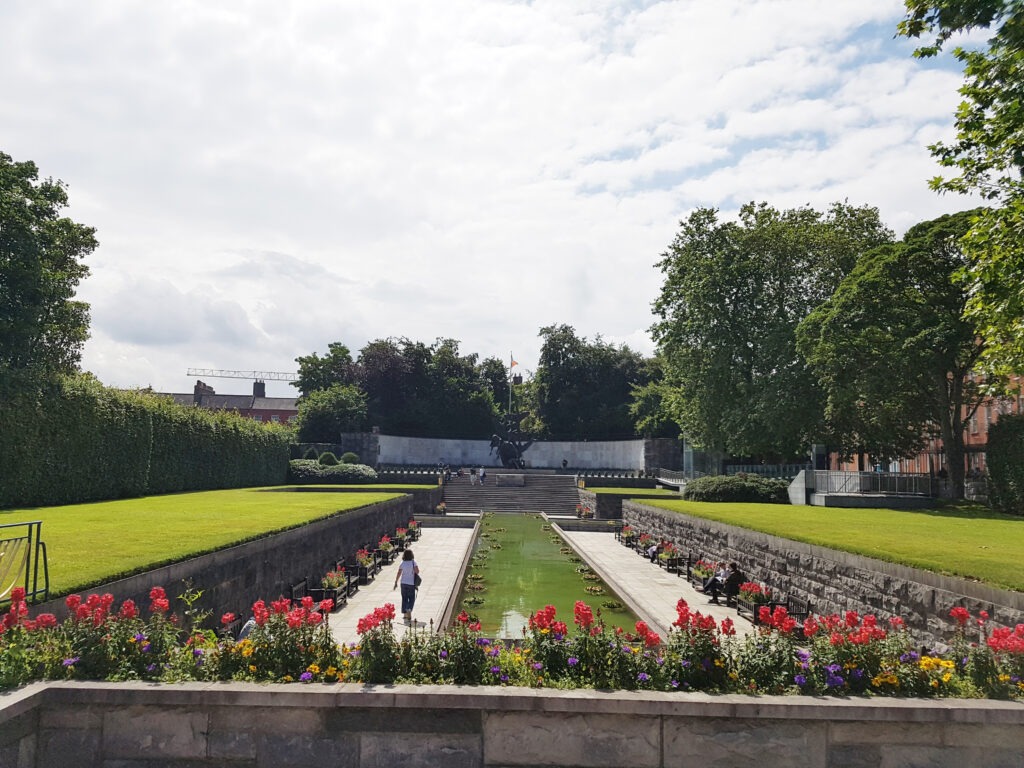
2. Ogród Pamięci (Garden of Remembrance) – będąc na O’Connell Street warto podejść nieco dalej do Parnell Square. Znajdziemy tam Ogród Pamięci, który został poświęcony pamięci „wszystkim, którzy oddali życie za irlandzką wolność”, dedykowany tym, którzy polegli w walce za niepodległość Irlandii. Ogród został oficjalnie otwarty w 1966 roku, w 50. rocznicę Powstania Wielkanocnego (Easter Rising) z 1916r.
2. Garden of Remembrance – while on O’Connell Street, it’s worth walking a little further to Parnell Square. There we will find the Garden of Remembrance, which was dedicated to the memory of „all who gave their lives for Irish freedom”, dedicated to those who died fighting for Irish independence. The garden was officially opened in 1966, on the 50th anniversary of the Easter Rising of 1916.
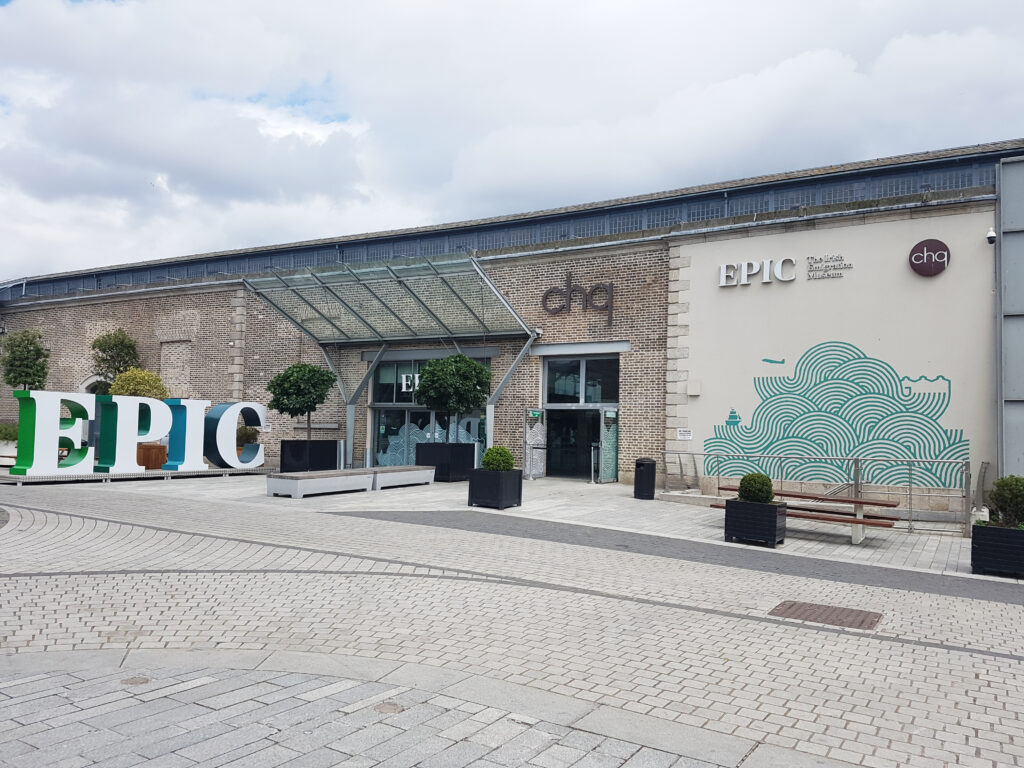
3. Muzeum EPIC (Irlandzkie Muzeum Imigracji) – EPIC Irlandzkie Muzeum Emigracji mieści się w dzielnicy Docklands i przedstawia historię irlandzkiej diaspory i emigracji do innych krajów. Muzeum EPIC zostało oficjalnie otwarte przez byłą prezydent Irlandii Mary Robinson w maju 2016 r. Budynek muzeum został zaprojektowany przez londyńską firmę projektową Event Communications i został uznany za „wiodącą atrakcję turystyczną Europy” w konkursie World Travel Awards 2019, 2020 i 2021.
3. EPIC Museum (Irish Immigration Museum) – EPIC The Irish Emigration Museum is located in the Docklands and tells the story of the Irish diaspora and emigration to other countries. The EPIC Museum was officially opened by former Irish President, Mary Robinson, in May 2016. The museum building was designed by London-based design firm Event Communications and was recognized as „Europe’s Leading Tourist Attraction” in the 2019, 2020 and 2021 World Travel Awards.
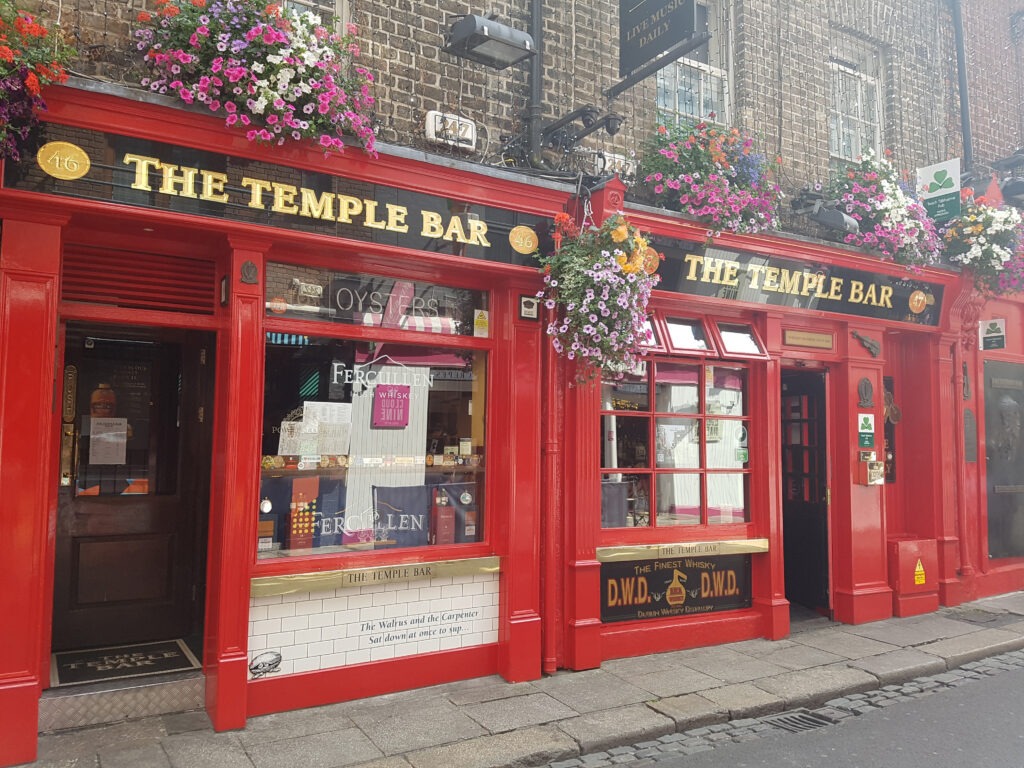
4. Temple Bar – Temple Bar to kulturalne i jednocześnie kultowe serce Dublina i jedna z najatrakcyjniejszych dzielnic stolicy łącząca różne obiekty kulturalne z dziesiątkami barów, restauracji i typowych irlandzkich pubów. Okolica słynie z bogatego życia nocnego, gdzie zarówno mieszkańcy, jak i turyści spotykają się, aby wypić kufel Guinnessa jak również inne klasyczne drinki, w tym oczywiście whisky (Irish whiskey). I tutaj warto zwrócić uwagę na pisownię tego trunku. W wersji brytyjskiej piszemy whisky, natomiast w wersji irlandzkiej oraz amerykańskiej – whiskey. Wymowa pozostaje taka sama, oczywiście z różnicą w akcencie. Znajdujące się pomiędzy ulicą Dame Street i rzeką Liffey wąskie i brukowane uliczki oraz urocza architektura tworzą niesamowity klimat tego miejsca. Warto dodać, że nazwa dzielnicy podobno wywodzi się od nazwiska Sir Williama Temple’a, który zbudował tu swój dom rodzinny na początku XVII wieku.
4. Temple Bar – Temple Bar is the cultural and iconic heart of Dublin and one of the most attractive districts of the capital, combining various cultural facilities with dozens of bars, restaurants and typical Irish pubs. The area is famous for its vibrant nightlife, where locals and tourists alike meet to enjoy a pint of Guinness and other classic drinks, including, of course, Irish whiskey. And here I would like to point out the spelling of this drink. In the British version we write whisky, while in the Irish and American versions whiskey. The pronunciation remains the same, with a difference in accent, of course. Located between Dame Street and the River Liffey, the narrow, cobbled streets and charming architecture create an amazing atmosphere. Apparently, according to some sources, the name of the district comes from the name of Sir William Temple, who built his family house here in the early 17th century.
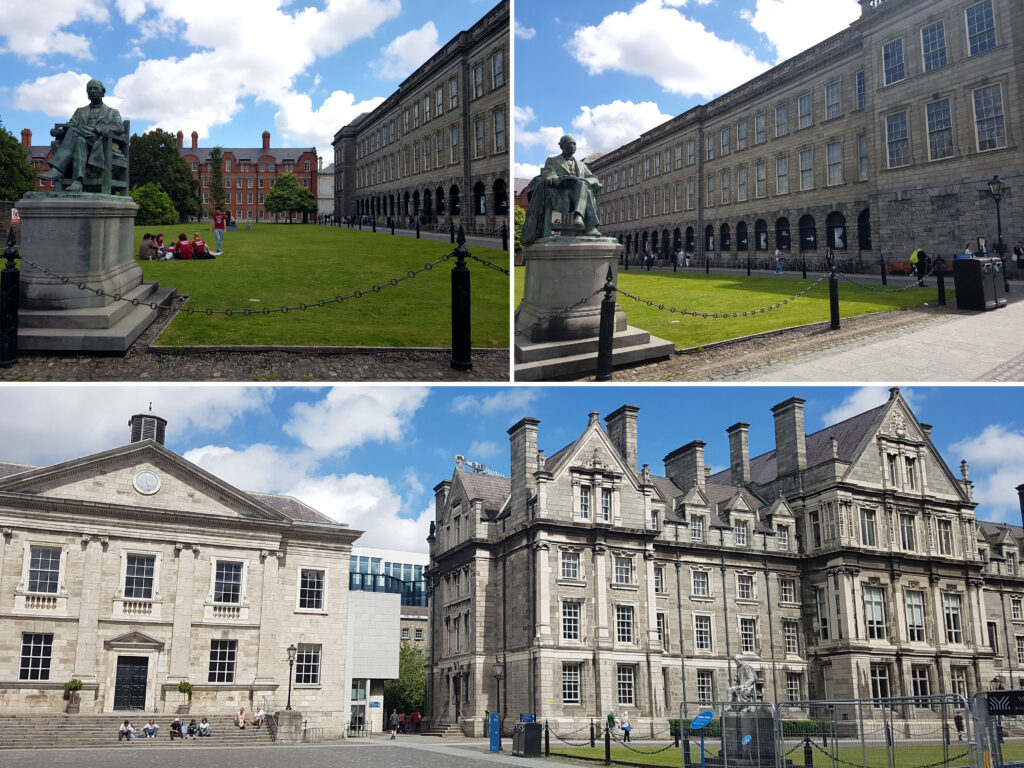
5. Trinity College – Trinity College położony jest w samym centrum Dublina i został założony w 1592 przez królową Elżbietę I na terenie dawnego klasztoru augustianów. Jest to najstarszy irlandzki uniwersytet, którego mury przesiąknięte są znamienitymi postaciami z historii Irlandii jak Samuel Beckett, Bram Stoker, Oscar Wilde i Edmund Burke. Chociaż w chwili otwarcia mogli tu studiować tylko protestanci, od 1793 roku przyjmowani byli również studenci katoliccy. Na szczególną uwagę zasługuje Biblioteka Trinity College, która posiada największą kolekcję książek i rękopisów w Irlandii. Prawdziwym skarbem Biblioteki jest “Księga z Kells” czyli słynny rękopis zawierający cztery Ewangelie Nowego Testamentu napisane po łacinie, której karty są misternie zdobione celtyckimi motywami roślinnymi i figuralnymi. Uważa się, że “Księga z Kells” została przepisana w IX wieku przez mnichów z opactwa Iona. Rękopis trafił do Trinity College w 1661.
Biblioteka Trinity College posiada największą kolekcję książek i rękopisów w Irlandii. Prawdziwym skarbem Biblioteki jest “Księga z Kells”czyli słynny rękopis zawierający cztery Ewangelie Nowego Testamentu napisane po łacinie, której karty są misternie zdobione celtyckimi motywami roślinnymi i figuralnymi. Uważa się, że “Księga z Kells” została przepisana w IX wieku przez mnichów z opactwa Iona. W tym czasie Wikingowie najechali Ionę, a mnisi, którzy przeżyli, uciekli do opactwa w Kells. Setki lat później rękopis został wysłany do Dublina, a w 1661 roku trafił do Trinity College.
5. Trinity College – Trinity College, which serves as Ireland’s oldest university, is located in the very centre of Dublin. It was founded in 1592 by Queen Elizabeth I on the site of a former Augustinian monastery. Its walls are permeated with distinguished figures from Irish history such as Samuel Beckett, Bram Stoker, Oscar Wilde and Edmund Burke. Although only Protestants could study here when it opened, from 1793 Catholic students were also admitted. The Trinity College Library is of particular note as it has the largest collection of books and manuscripts in Ireland. The true treasure of the Library is the „Book of Kells”, a famous manuscript containing the four Gospels of the New Testament written in Latin, the pages of which are intricately decorated with Celtic floral and figural motifs. The Book of Kells is believed to have been transcribed in the 9th century by monks from Iona Abbey. The manuscript reached Trinity College in 1661.
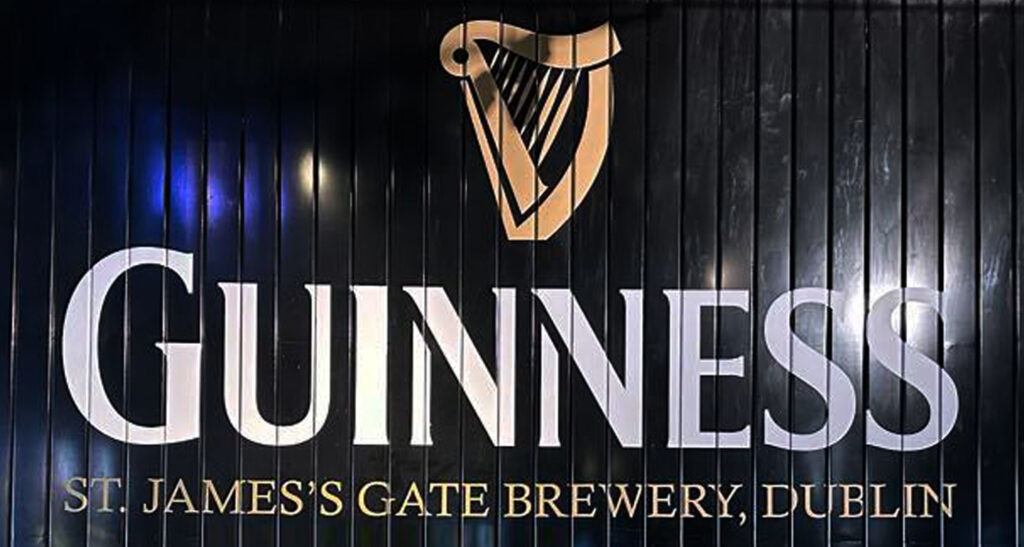
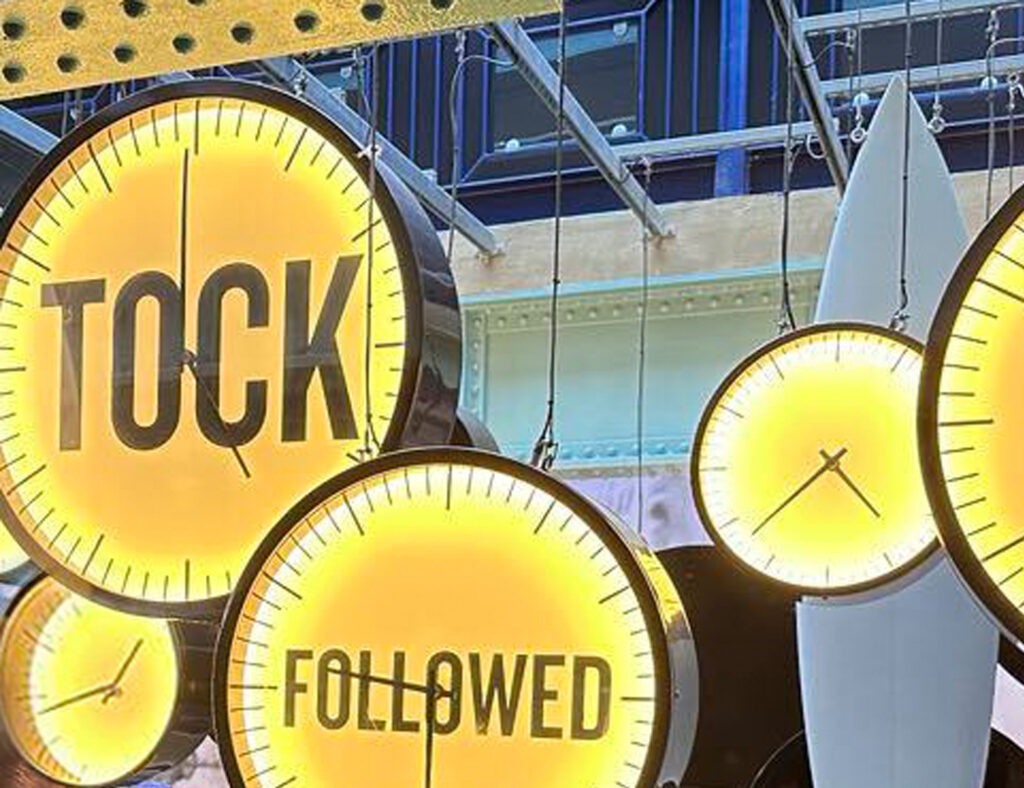
6. Muzeum Browaru Guinnessa (Guinness Storehouse) – Muzeum Browaru Guinnessa to kolejne interesujące miejsce na mapie Dublina warte odwiedzenia nie tylko dla koneserów ciemnego piwa znanego na całym świecie. Guinness Storehouse powstał w 1904 roku jako zakład fermentacyjny dla browaru St. James’ Gate. W 1988 roku został zamknięty, a dekadę później, w 2000 roku, przekształcono go w siedmiopiętrowe muzeum. Na każdym piętrze odwiedzających czeka coś interesującego. Na ostatnim siódmym piętrze mieści się Gravity Bar, ze wspaniałym widokiem na Dublin, w którym można otrzymać darmowy kufel stouta Guinnessa.
6. Guinness Brewery Museum (Guinness Storehouse) – The Guinness Brewery Museum is another interesting place on the map of Dublin worth visiting not only for connoisseurs of the world-famous dark beer. The Guinness Storehouse was established in 1904 as a fermentation facility for the St. James’ Gate Brewery. It was closed in 1988, and a decade later, in 2000, it was transformed into a seven-storey museum. There is something interesting waiting for visitors on each floor. On the top seventh floor there is the Gravity Bar, with a wonderful view of Dublin, where you can get a free pint of Guinness stout.
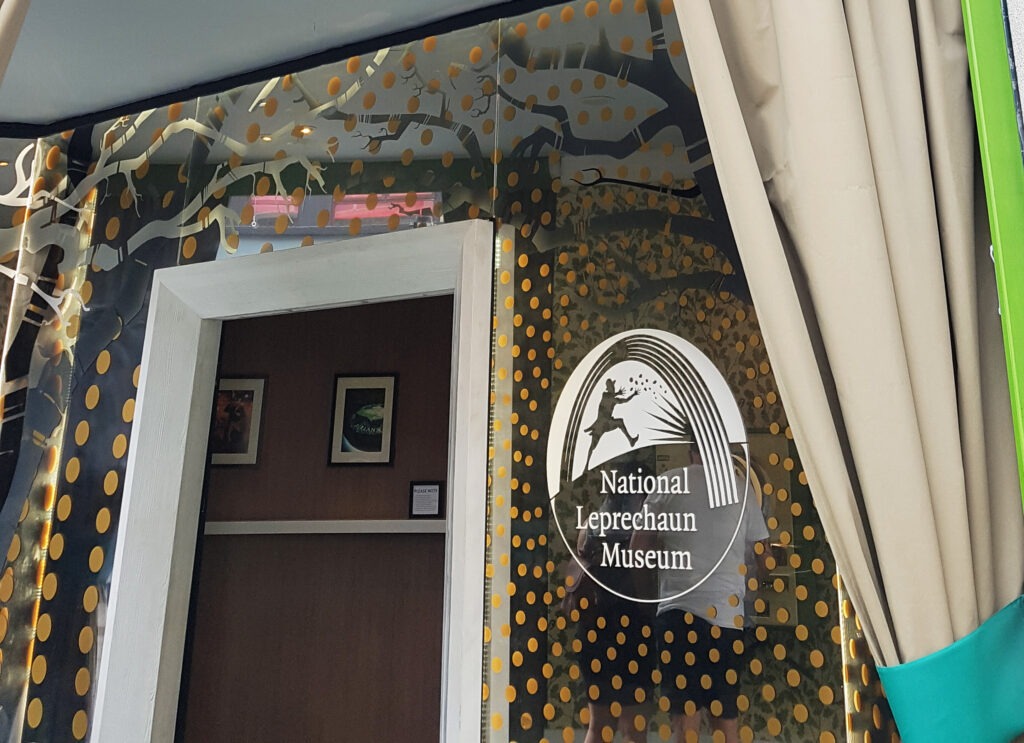
7. Narodowe Muzeum Krasnoludków – Narodowe Muzeum Krasnoludków to prywatne muzeum poświęcone irlandzkiemu folklorowi i mitologii. To tutaj można poznać fascynujące legendy o krasnalach i przenieść się choć na chwilę w bajkowy świat tych niewielkich stworzeń. Od 2010 roku mieści się przy Jervis Street, nieopodal Henry Street, jednej z głównych ulic w centrum miasta. Uważa się, że jest to pierwsze muzeum krasnoludków na świecie. Odwiedzający muzeum biorą udział w wycieczce z przewodnikiem obejmującej kilka różnych pomieszczeń, gdzie można posłuchać ciekawych opowiadań i historii o tych irlandzkich stworzeniach.
7. The National Leprechaun Museum – is a private museum dedicated to Irish folklore and mythology. It is here that you can learn about fascinating legends about dwarves and move, at least for a moment, into the fairy-tale world of these small creatures. Since 2010, it has been located on Jervis Street, near Henry Street, one of the main streets in the city centre. It is believed to be the first dwarf museum in the world. Visitors to the museum take part in a guided tour of several different rooms where they can listen to interesting stories and tales about these Irish creatures.
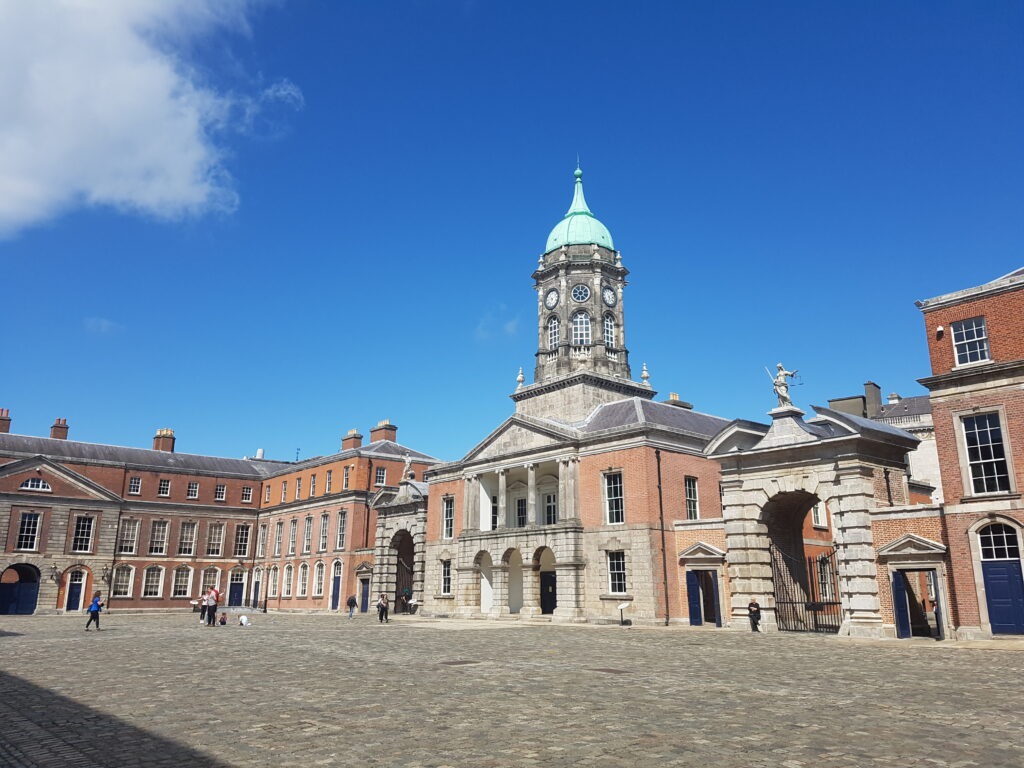
8. Zamek Dubliński – Zamek Dubliński mieści się nieopodal Katedry Kościoła Chrystusowego i na przestrzeni wieków odgrywał ważną rolę. Początkowo dawne miejsce osadnictwa Wikingów, zostało przekształcone w fortecę wojskową, rezydencję królewską, a następnie stało się irlandzkim Trybunałem Sprawiedliwości. Dawniej w zamku mieściła się siedziba irlandzkiego rządu pod panowaniem brytyjskim. Choć fasada twierdzy została niemal całkowicie odbudowana po poważnym pożarze w 1684 roku, jej wnętrze zachowało się bardzo dobrze. W związku z pełnieniem funkcji rezydencji królewskiej można nadal podziwiać bogato zdobiona wnętrza z licznymi dywanami i antykami.
8. Dublin Castle – Dublin Castle is located near Christ Church Cathedral and has played an important role over the centuries. Initially a former Viking settlement, it was transformed into a military fortress, a royal residence, and then became the Irish Court of Justice. The castle formerly housed the seat of the Irish government under British rule. Although the facade of the fortress was almost completely rebuilt after a serious fire in 1684, its interior has been preserved very well. Due to its function as a royal residence, you can still admire the richly decorated interior with numerous carpets and antiques.
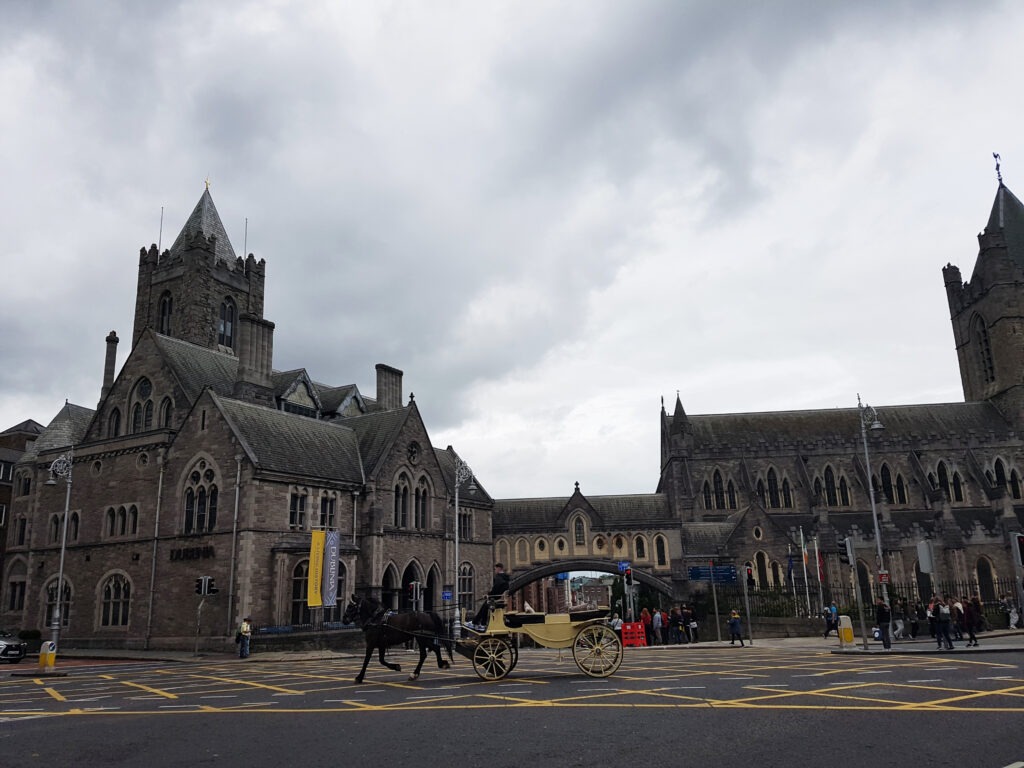
9. Katedra Christ Church – znajduje się w centrum Dublina, niedaleko katedry św. Patryka i zamku w Dublinie i jest starszą z dwóch średniowiecznych katedr w mieście, drugą jest katedra św. Patryka. Katedra została założona na początku XI wieku za panowania króla Wikingów. Pod koniec XII wieku została odbudowana z kamienia za panowania normańskiego potentata Strongbow i znacznie powiększona na początku XIII wieku przy użyciu kamieni i rzemieślników z Somerset. Częściowe zawalenie się katedry w XVI wieku pozostawiło ją w złym stanie, a pod koniec XIX wieku budynek został gruntownie odnowiony i przebudowany, nadając mu dzisiejszy kształt, łącznie z wieżą, przyporami i charakterystyczną zadaszoną kładką.
9. Christ Church Cathedral – is located in the centre of Dublin, close to St. Patrick’s Cathedral and Dublin Castle and is the older of the city’s two medieval cathedrals, the other being St. Patrick’s Cathedral. The cathedral was founded in the early 11th century during the reign of the Viking king. In the late 12th century it was rebuilt in stone under the Norman potentate Strongbow and greatly enlarged in the early 13th century using stones and craftsmen from Somerset. The partial collapse of the cathedral in the 16th century left it in poor condition, and in the late 19th century the building was extensively renovated and rebuilt to its present form, including the tower, buttresses and distinctive covered footbridge.
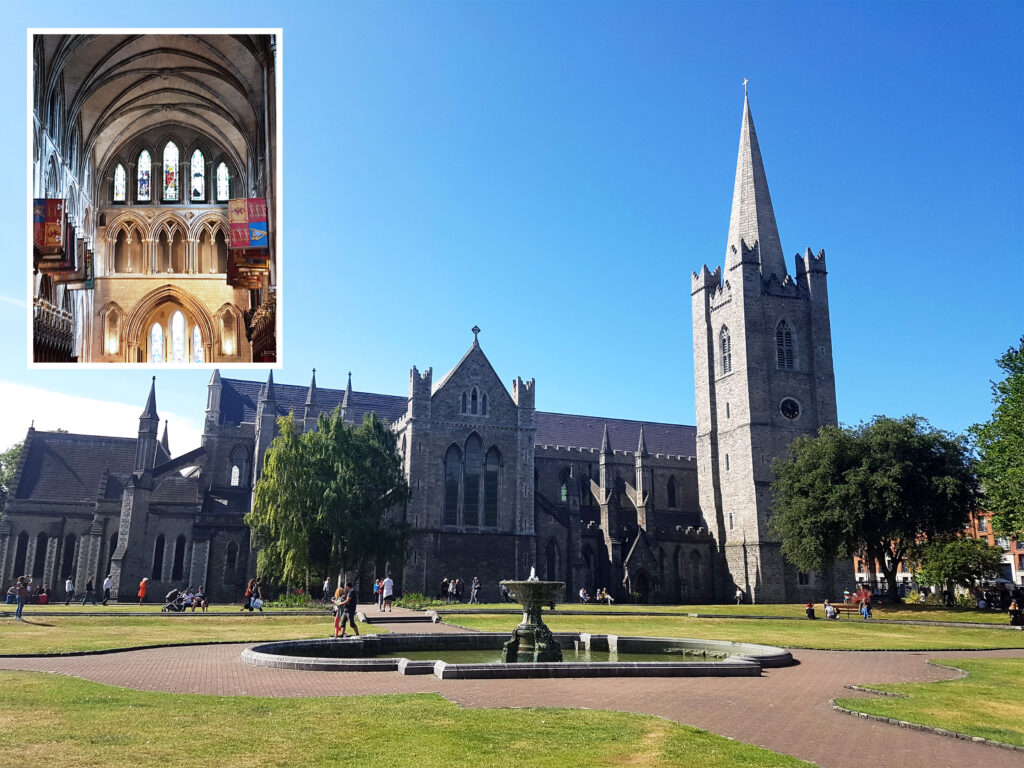
10. Katedra św. Patryka – została założona na cześć patrona Irlandii (misjonarza z V w.) i należy do kościoła irlandzkiego, podobnie jak Katedra Kościoła Chrystusowego. Katedra ta jest największym kościołem w Irlandii a została wzniesiona w pobliżu studni, przy której około 450 roku patron Irlandii ochrzcił nawróconych. To dzięki św. Patrykowi główną religią w Irlandii jest chrześcijaństwo. Niestety w następstwie pożaru w 1370 roku część kościoła uległa zniszczeniu, ale na szczęście zniszczona wieża i nawa zostały pomyślnie odbudowane. Po latach profanacji i pożarów Katedra św. Patryka została odrestaurowana w 1860 roku.
Legenda głosi, iż na Szmaragdowej Wyspie – jak również określana jest Irlandia – nie ma węży, ponieważ św. Patryk przepędził ich wszystkich z kraju jako, że widział w nich symbol zła.
10. St. Patrick’s Cathedral – St. Patrick’s Cathedral was founded in honour of the patron saint of Ireland (a fifth century missionary) and belongs to the Church of Ireland, just like the Christ Church Cathedral. This cathedral is the largest church in Ireland and was built near the well at which the patron saint of Ireland baptized converts around the year 450. It is thanks to St Patrick that the prevalent religion in Ireland is Christianity. Unfortunately, following a fire in 1370, part of the church was destroyed, but fortunately the destroyed tower and nave were successfully rebuilt. After years of desecration and fires, the St. Patrick’s Cathedral was restored in 1860.
Legend has it that there are no snakes in Ireland (also referred to as Emerald Isle) thanks to St Patrick who drove all the snakes from Ireland as he viewed them as a symbol of evil.
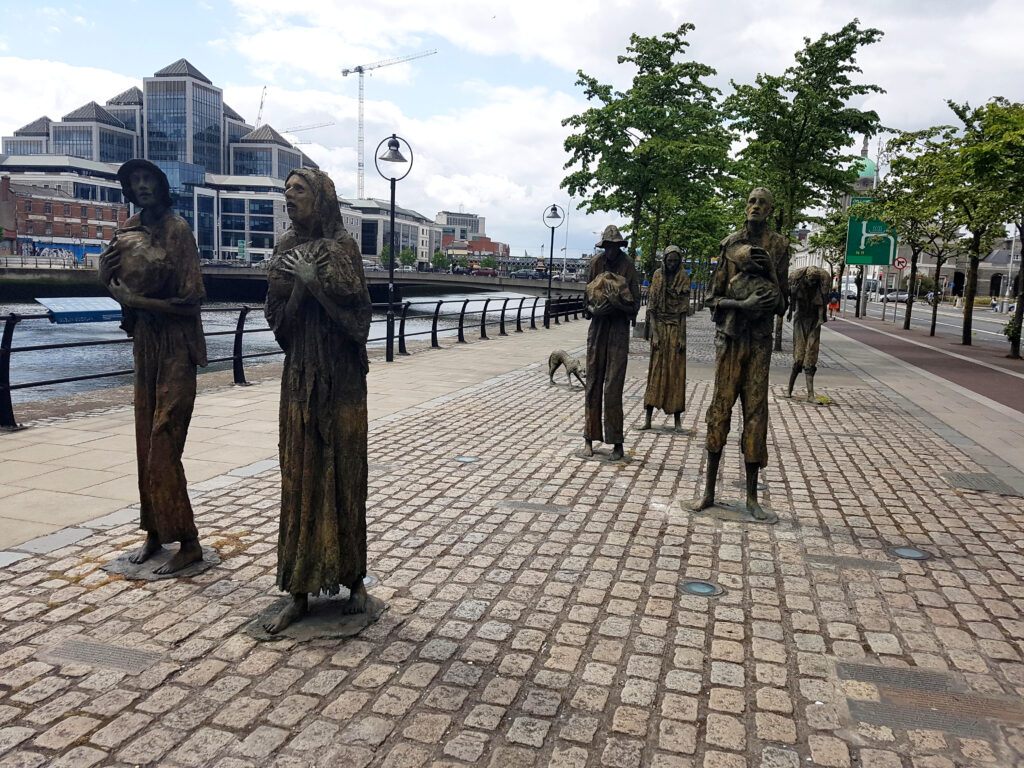
11. Famine Memorial (Pomnik Ofiar Głodu) – Famine Memorial stoi na nabrzeżu Urzędu Celnego i upamiętnia ofiary Wielkiego Głodu, który miał miejsce w Irlandii w latach 1845–1849, podczas którego liczba ludności kraju zmniejszyła się o połowę w wyniku śmierci i emigracji. Pomnik został podarowany miastu Dublinowi w 1997 r. i przedstawia sześć naturalnej wielkości postaci ubranych w łachmany, ściskających swoje rzeczy i dzieci. Pomnik symbolizuje emigrantów opuszczających wygłodniałą Irlandię w poszukiwaniu nowego życia.
11. Famine Memorial – The Famine Memorial stands on the Custom House quay and commemorates the victims of the Great Famine that took place in Ireland in 1845–1849, during which the country’s population was halved as a result of death and emigration. The monument was donated to the city of Dublin in 1997 and depicts six life-size figures dressed in rags, clutching their belongings and children. The monument symbolises emigrants leaving famished Ireland in search of a new life.
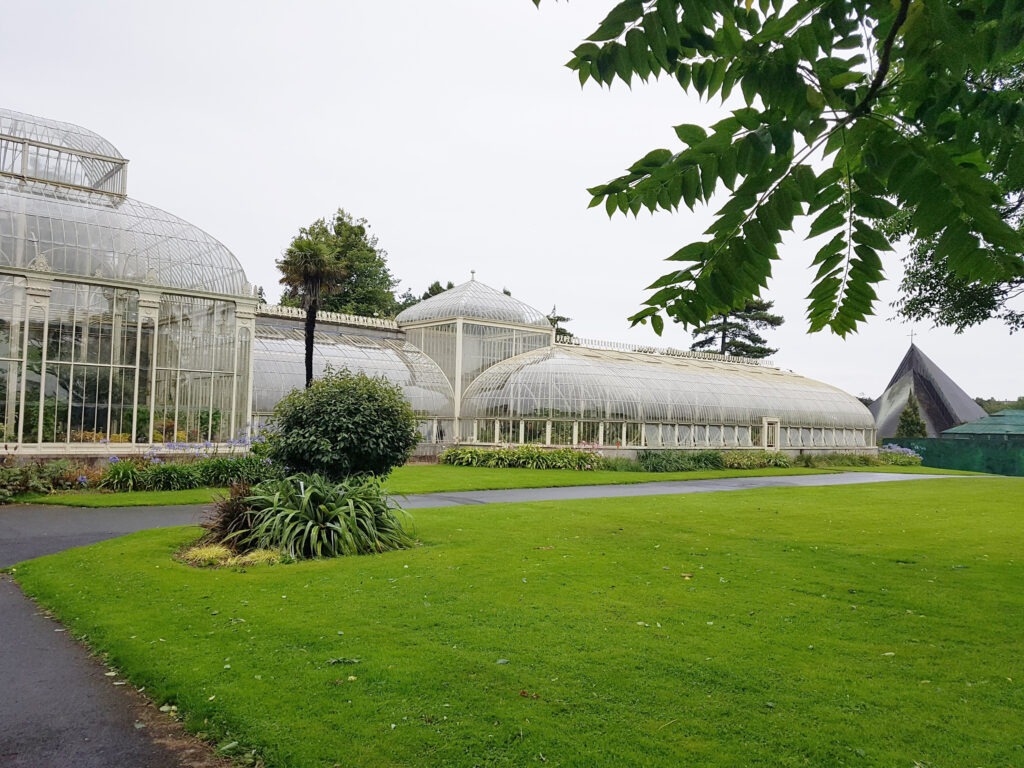
12. Narodowy Ogród Botaniczny – Narodowy Ogród Botaniczny został otwarty w 1795 roku i stanowi prawdziwą oazą spokoju, położoną 3,5 km od centrum Dublina. Na powierzchni prawie 20 hektarów rośnie ponad 17 tysięcy gatunków roślin z całego świata, z czego 300 z nich jest zagrożonych wyginięciem, a niektóre już nie występują poza ogrodem. Na przestrzeni lat 1843–1869 wybudowano tu kilka szklarni, aby chronić egzotyczne kwiaty i krzewy przed wilgotnym klimatem miasta. Najbardziej wyjątkowe obszary Ogrodów to Ogród Różany, Dom Orchidei, Ogród Chiński oraz Ogród Skalny jednak cały kompleks tworzy miejsce, które warto odwiedzić o każdej pogodzie.
12. National Botanical Garden – The National Botanic Garden opened in 1795 and is a true oasis of peace, located 2 miles from Dublin city center. Over 17,000 plant species from all over the world grow on an area of almost 20 hectares, of which 300 are at risk of extinction, and some no longer occur outside the garden. Between 1843 and 1869, several greenhouses were built here to protect exotic flowers and shrubs from the city’s humid climate. The most unique areas of the Gardens are the Rose Garden, the Orchid House, the Chinese Garden and the Rock Garden, but the entire complex creates a place worth visiting in any weather.
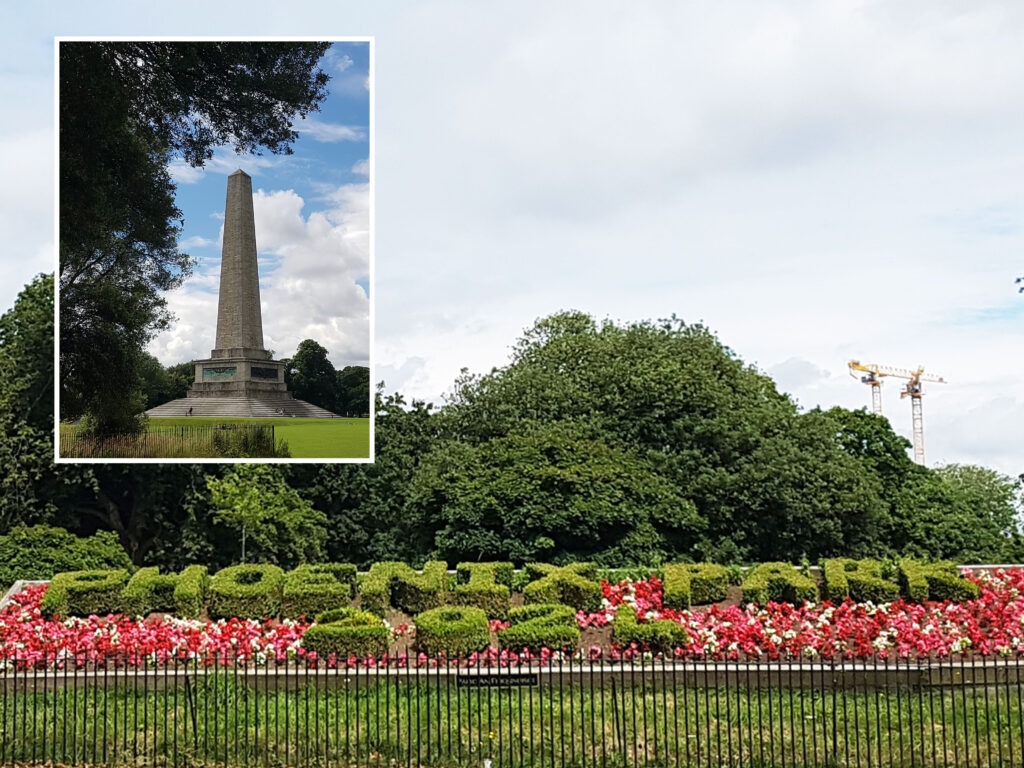
13. Phoenix Park – to park miejski położony niecałe 5 km na zachód od centrum Dublina i na północ od rzeki Liffey. Park jest otoczony murem o długości 11 km i obejmuje powierzchnię ponad 700 hektarów, co czyni go jednym z największych ogrodzonych parków miejskich w Europie. W parku znajdują się zielone obszary użytkowe i aleje, a od XVII wieku mają tu swój dom stada dzikich danieli. Phoenix Park powstał pierwotnie jako królewski teren łowiecki w 1662 roku a niecały wiek później został udostępniony dla wszystkich jako park miejski. Na terenie parku znajduje się m.in. zoo, Monument Wellingtona, rezydencja prezydenta Irlandii, ambasada Stanów Zjednoczonych.
13. Phoenix Park – is a city park located less than 5 km west of Dublin city centre and north of the River Liffey. The park is surrounded by an 11 km long wall and covers an area of over 700 hectares, making it one of the largest fenced city parks in Europe. The park contains green utility areas and avenues, and herds of wild fallow deer have made their home here since the 17th century. Phoenix Park was originally created as a royal hunting ground in 1662 and less than a century later it was opened to the public as a city park. The park includes a zoo, Wellington Monument, residence of the President of Ireland, US Embassy.
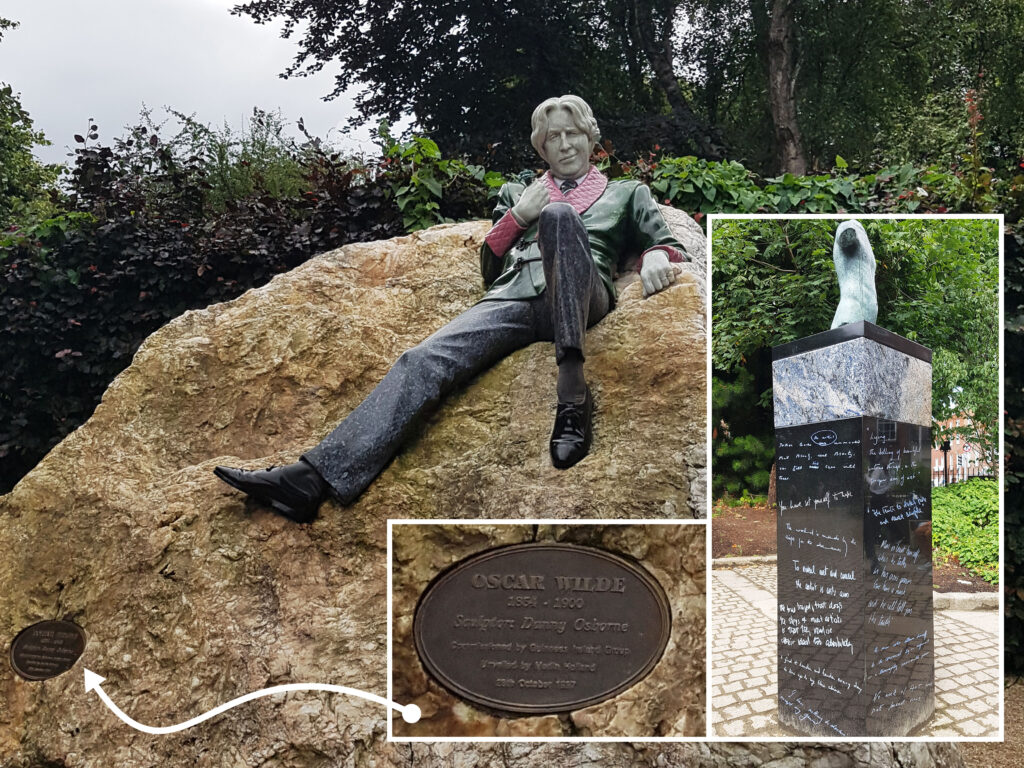
14. Merrion Square – mieści się w samym sercu Dublina, to zielony park z pięknymi ogrodami kwiatowymi i wrzosowymi, placem zabaw oraz miejscem nieopodal bramy wejściowej, które przyciąga mnóstwo turystów czyli pomnikiem Oscara Wilde’a, słynnego irlandzkiego poety, prozaika i dramatopisarza urodzonego w Dublinie, autora m.in. takich dzieł jak Portret Doriana Graya.
14. Merrion Square – is located in the heart of Dublin, it is a green park with beautiful flower and heather gardens, a playground and a place near the entrance gate that attracts many tourists, i.e. a monument to Oscar Wilde, the famous Irish poet, prose writer and playwright born in Dublin, the author of such works as The Picture of Dorian Gray.
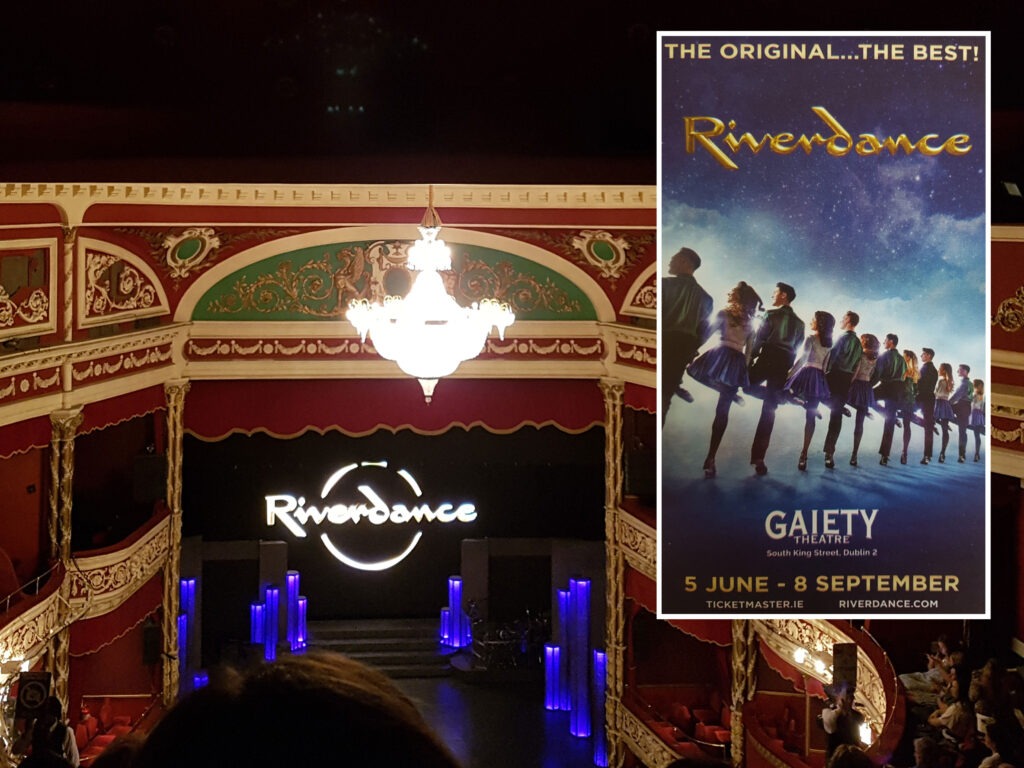
15. Riverdance w Teatrze Gaiety – Riverdance – to fenomenalne przedstawienie kultury irlandzkiej w formie charakterystycznego świetnie zsynchronizowanego tańca irlandzkiego z wykorzystaniem stepowania, śpiewu przy akompaniamencie instrumentów takich tak skrzypce, harfa czy flet. Obraz historii i kultury irlandzkiej wyrażony sztuką tańca na najwyższym poziomie w sposób nowoczesny i innowacyjny. To swoiste dopełnienie klimatu irlandzkiego. Warto zatem wstąpić do Teatru Gaiety tuż obok Grafton Street i przez dwie godziny oddać się tej formie sztuki.
15. Riverdance at the Gaiety Theatre – is a phenomenal presentation of Irish culture in the form of a characteristic, perfectly synchronized Irish dance using tap dancing and singing accompanied by instruments such as fiddle, harp and flute. A depiction of Irish history and culture expressed through the art of dance at the highest level in a modern and innovative way. It is a kind of complement to the Irish climate. It is therefore worth stopping by the Gaiety Theatre just off Grafton Street and giving yourself over to this art form during the two-hour show.
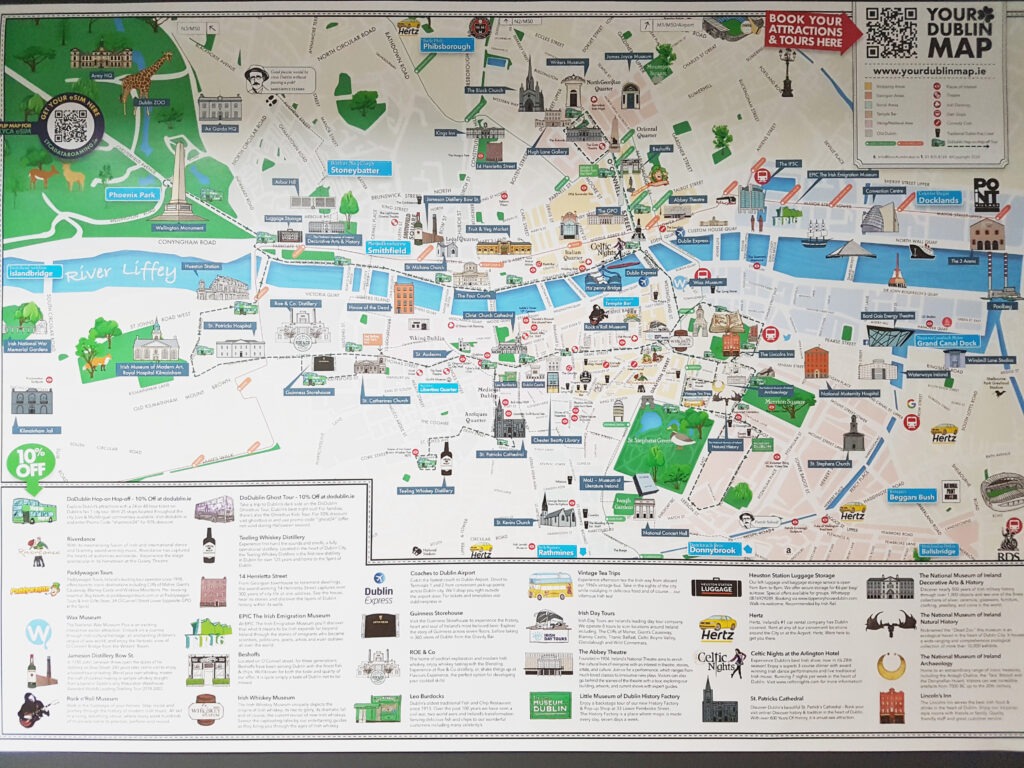
JAK PORUSZAĆ SIĘ PO DUBLINIE
Większość najważniejszych atrakcji turystycznych skupiona jest w centrum miasta, wokół rzeki Liffey a zatem na zwiedzanie miasta najlepiej udać się pieszo lub rowerem. W mieście jest wiele punktów gdzie można wypożyczyć rowery za dobrą cenę więc w ten sposób można szybciej i zdrowiej przemierzyć irlandzką stolicę. Oprócz tego po Dublinie bez problemu można poruszać się komunikacją miejską, po centrum kursują tramwaje a autobusy dojeżdżają do większości miejsc. W odróżnieniu do czerwonych londyńskich double-deckers, po Dublinie jeżdżą żółto-zielone double-deckers.
HOW TO GET AROUND DUBLIN
Most important tourist attractions are concentrated in the city center, around the River Liffey, so it is best to explore the city on foot or by bike. There are many places in the city where you can rent bikes at a reasonable price, so this way you can travel around the Irish capital faster and in a healthier way. In addition, you can easily get around Dublin by public transport, trams run through the centre and buses reach most places within the city and beyond.
CO WARTO ZJEŚĆ W DUBLINIE
WHAT TO EAT IN DUBLIN
Jak na wyspiarski kraj przystało, na irlandzkim stole powinny znaleźć się wszelkiego rodzaju ryby czy inne owoce morza. Tych ostatnich nie testowałam w Dublinie, lecz ryby naprawdę są warte polecenia. Przede wszystkim są świeże i smaczne. Typowe danie obiadowe to właśnie ryba przyrządzana na wiele różnych sposobów, np. łosoś, dorsz czy turbot z grilla, do tego ziemniaki w różnych postaciach (najczęściej pieczone, w formie wedges) i porcja innych warzyw. Miejscem godnym polecenia jest restauracja Kingfisher znajdująca się na Parnell Street, naprzeciwko centrum handlowego.
Jeśli chodzi o śniadania to nie różnią się znacząco od tych na Wyspach Brytyjskich, można więc delektować typowym ciepłym angielskim śniadaniem w postaci smażonych jajek, kiełbasek i fasolki po bretońsku. Oprócz tego można spotkać wszelkiego rodzaju crossainty, brioszki, angielskie scones, musli, płatki zbożowe, tosty, jajka, owoce itp.
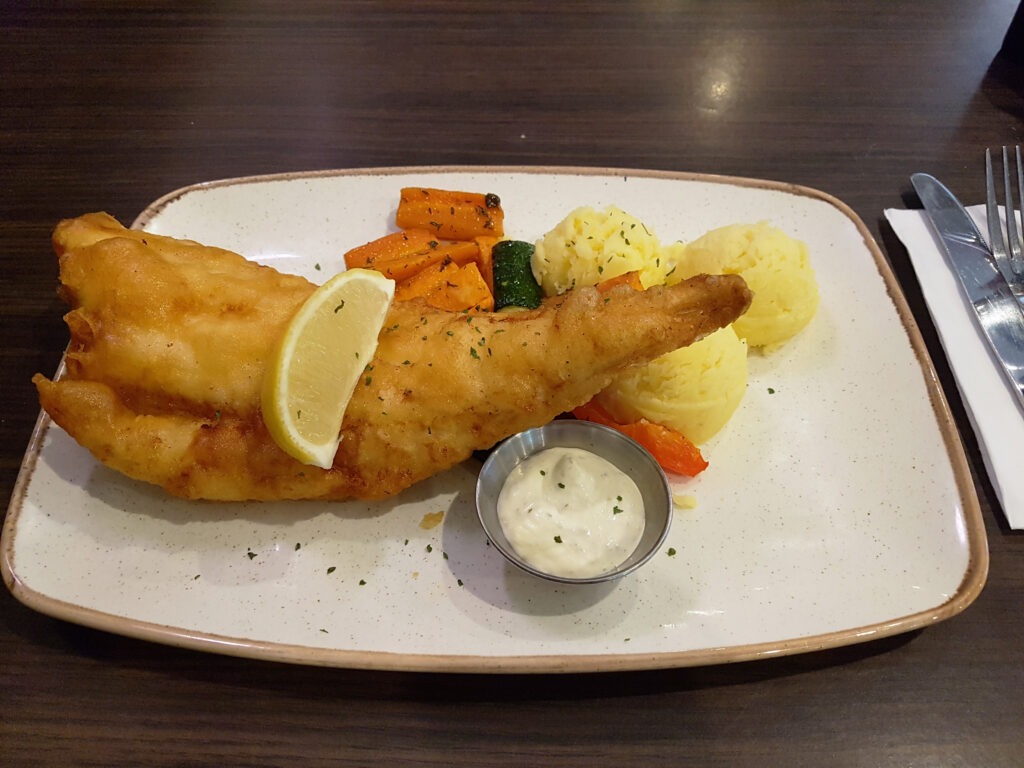
As befits an island country, the Irish table should include all kinds of fish and other seafood. I haven’t tested the latter in Dublin, but the fish are really worth recommending. First of all, they are fresh and tasty. A typical dinner dish consists of fish prepared in many different ways, e.g. salmon, cod or grilled turbot, plus potatoes in various forms (usually baked, in the form of wedges) and a portion of other vegetables. A place worth recommending is the Kingfisher restaurant located in Parnell Street, opposite the shopping center.
When it comes to breakfasts, they do not differ significantly from those in the British Isles, so you can enjoy a typical warm English breakfast in the form of fried eggs, sausages and baked beans. In addition, you can find all kinds of crossaints, brioche, English scones, muesli, cereals, toast, eggs, fruit, etc.
PODSUMOWANIE
Jak widzimy Dublin oferuje wiele ciekawych atrakcji i aktywności zarówno wewnątrz przy niezbyt ładnej pogodzie, jak i na zewnątrz kiedy aura jest bardziej sprzyjająca a należy podkreślić fakt, że ze względu na położenie, Irlandia nie należy do najbardziej ulubionych kierunków z uwagi na dużą ilość deszczowych i wilgotnych dni, małe nasłonecznienie oraz wiatr. Oprócz wymienionych punktów charakterystycznych dla stolicy, warto udać się nieco dalej i dokonać eksploracji pobliskich atrakcji turystycznych, które oferuje szczególnie przyroda wraz z unikalną architekturą i irlandzkim dziedzictwem kulturalnym. Z tych względów dobrze udać się do Howth, Powerscourt czy Glendalough a dysponując większą ilością czasu prawdziwą perłą na mapie turystycznej są słynne klify Moheru w zachodniej części kraju, z pięknym widokiem na ocean. Więcej na temat urokliwych miejsc w Irlandii postaram się przekazać w kolejnych postach.
SUMMARY
As we can see, Dublin offers many interesting attractions and activities both indoors when the weather is not very nice, and outdoors when the weather is more favourable, and it should be emphasized that due to its location, Ireland is not one of the most favourite destinations due to the large number of rainy and humid days, little sunlight and wind. In addition to the above-mentioned points characteristic of the capital, it is worth going a little further and exploring nearby tourist attractions, which are offered particularly by nature together with the unique architecture and Irish cultural heritage. For these reasons, it is a good idea to go to Howth cliffs, Powerscourt or Glendalough, and if you have more time, a real pearl on the tourist map are the famous Cliffs of Moher in the western part of the country, with a beautiful view of the ocean. I will try to share more about charming places in Ireland in my future posts.

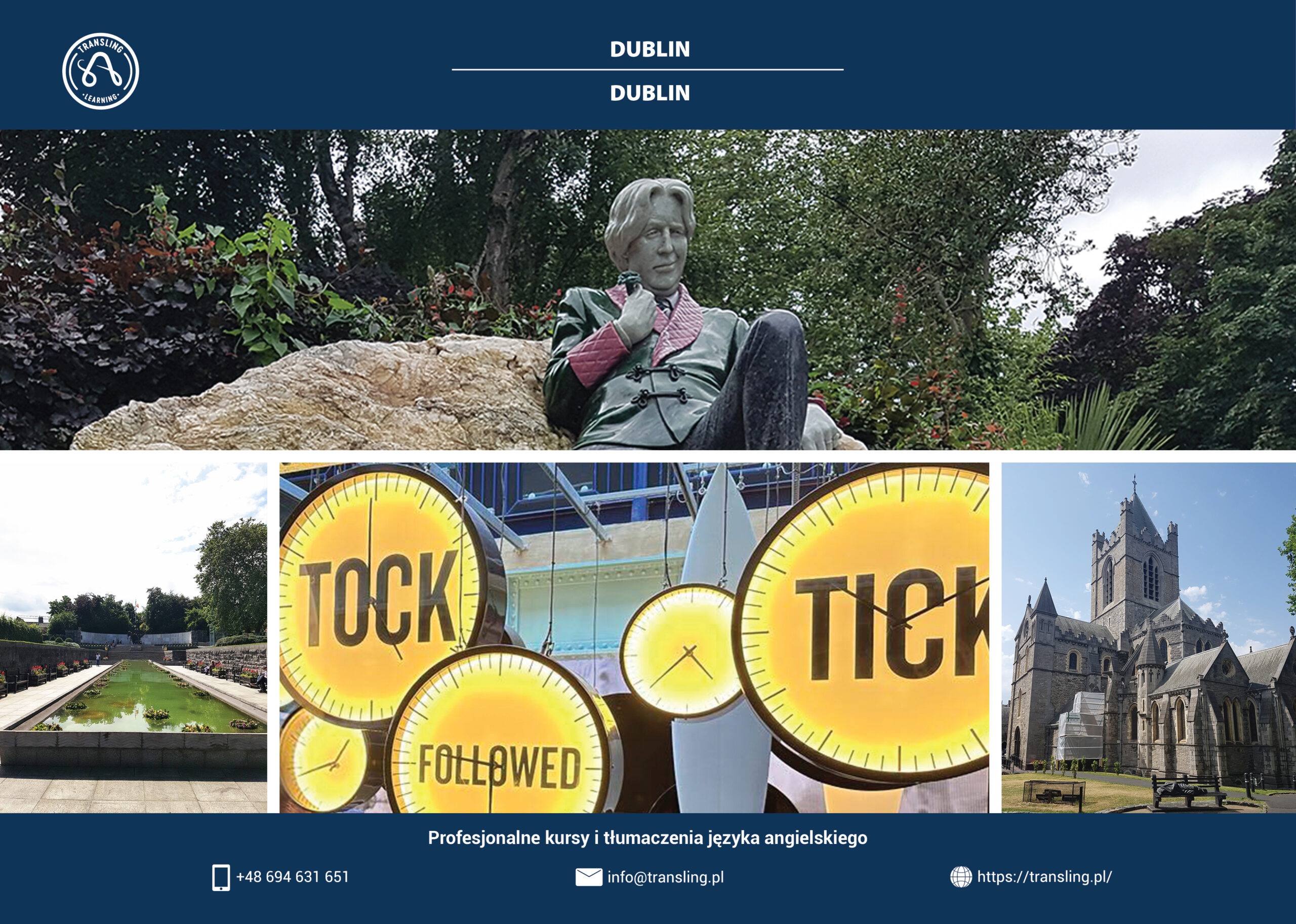
Hi there, yeah this piece of writing is truly pleasant and I have learned lot of things from it regarding blogging.
thanks. https://bandur-Art.Blogspot.com/2024/08/the-ultimate-guide-to-no-mans-sky-mods.html
Thank you very much for your comments and feedback.
Very quickly this website will be famous amid all blogging
people, due to it’s good articles or reviews https://lvivforum.pp.ua
Thank you for the uplifting comments, very much appreciated.
It’s really a cool and useful piece of information. I’m glad that you just shared this
helpful info with us. Please keep us up tto date like this.
Thank you for sharing. https://www.laundrynation.com/community/profile/michaelbargas/
Thank you very much for your feedback.
Hello There. I found yur webblog uxing msn. That is a really smartly writteen article.
I’ll make sure to bookmark it and rdturn to learn more of your useful information.
Thank you for the post. I’ll certainly return. https://www.fimfiction.net/user/715760/Jessica+Gallagher
Thank you very much for your comments and feedback.
This iis really interesting, You’re a very
skilled blogger. I have joined your rss feed and look forward
to seeking more of your magnificent post. Also, I’ve shared
yoour web site iin my social networks! https://www.thesims3.com/myBlog.html?persona=aviator384&showBlogMasterPopup=false
Thank you! I do appreciate your comments and feedback.
Thanks ffor aany other wonderful post. Where else mmay
just anyone get that kind of information in such a perfect
way of writing? I have a presentation subsequent week, and I’m
onn the search for such info. https://gab.com/Wifer1950/posts/112224067718835744
Thank you very much for the feedback and good luck with your presentation.
This site truly has all the info I wanted about this subject and didn’t know who to ask. https://rentry.co/ipozy
Thank you very much for the feedback. I’m glad you find the post helpful.
Wonderful website. Lots of useful information here.
I’m sending iit to some friends anns also sharing in delicious.
And of course, thanks to your sweat! https://www.niftygateway.com/@aimeeduffy34
Thank you very much for such positive and uplifting feedback, very much appreciated.
Valuable information. Fortunate me I found your website
by chance, aand I am stunned why this coincidence did not took place in advance!
I bookmarked it. https://play.eslgaming.com/player/20021759/
I do appreciate your comments and feeeback. Thank you very much for your interest in the posts.
Hey would yoou mind stating which blog platform you’re working with?
I’m looking to start my own boog soon but I’m having a tough time making a decision beween BlogEngine/Wordpress/B2evolution and Drupal.
The reason I ask is because your design seems different then most blogs
and I’m looking for something unique.
P.S Sorry for getting off-topic buut I had to ask! https://www.horseracingnation.com/user/aviators
Thank you for your feedback and comments. I’m using WordPress and for now it seems a reliable platform.
Hey! Quicdk question that’s entirely off topic.
Do you know how to make your site mobile friendly?
My website looks weird when browsing from my alple iphone.
I’m trying to find a template or plugin that might be abpe to correct this issue.
If you have any suggestions, please share.
Appreciate it! https://cs.finescale.com/members/aviator_2d00_game.in/default.aspx
Hello. Thank you for your comments. I’m sorry to hear you have come up against some technical issues. My site is responsive but it has not been prepared for all kinds of devices such as Iphones.
I couldn’t refrain from commenting. Perfectly written! https://hashnode.com/@emmaconnor738
Thank you for very much for such uplifting comments. I do appreciate your feedback.
I constantly spent my half an hour to read this blog’s articpes or reviews all the time alng
with a cup of coffee. https://caramellaapp.com/milanmu1/QHAkA0P1W/warum-online-casino-die-beste-loesung-ist
Thank you for the comments. I’m glad to hear you enjoy reading the posts.
Now I am going away to do my breakfast, afterward having my breakfast coming again to read
other news. https://www.xn--ob0br92bvvc.com/bbs/board.php?bo_table=free&wr_id=197949
It’s nice to hear you find the posts so engaging and engrossing. Enjoy reading as there is much more to come.
Wow! Finally I got a web site from where I be capable of really get
valuable information concerning my study and knowledge. http://forum.altaycoins.com/profile.php?id=853466
Thank you for such positive feedback and uplifting comments. I hope you you will find next posts also useful and interesting.
Very nice post. I just stumbled upon your blog andd wanted to say that I have really enjoyed
browsing your blog posts. In any case I’ll be subscribing to your rss feed and I hope you write again very
soon! http://forum.pinoo.com.tr/profile.php?id=1190925 http://forum.pinoo.com.tr/profile.php?id=1190925
Thank you very much for your feedback. It’s great to hear you enjoy reading my posts. I hope you will find next posts also engaging and interesting.
Fantaastic website. Loots of helpful information here.
I amm srnding it too a few frriends ans additionally sharing in delicious.
And obviously, thanks in ypur effort! https://www.kupi-prodaj.eu/poklanjam/how-do-you-write-a-good-introduction-to-a-thesis-or-dissertation_2205
Thank you for your comments. I do appreciate your feedback and recommendation.
Wow, amazing blog layout! How long have you been blogging for?
you make bloggging look easy. The overall look of your web
sote iis great, let alone the content! http://skyticket.co.kr/bbs/board.php?bo_table=free&wr_id=26001
Thank you for such positive feedback and appreciation. It’s great to hear you find the posts interesting.
Howdy very nice website!! Guy .. Excellent .. Amazing ..
I will bookmark your blog andd take the feeds also? I’m
satisfied too search out numerous usefull information rihht
here in tthe submit, we want work out more techniques on this regard,
thanks for sharing. . . . . . https://www.camedu.org/blog/index.php?entryid=36811
Thank you. I do appreciate your comments and feedback.
Great delivery. Outstanding arguments. Keep up the amazing
spirit. https://rehab.or.kr/bbs/board.php?bo_table=volunteer_request&wr_id=30387
I do appreciate your positive feedback. Thank you very mch for such uplifting comments.
Greetings! Very helpful advice in this particular post!
It is the little changes that produce the largest changes.
Thaks for sharing! https://www.camedu.org/blog/index.php?entryid=36944
Thank you very much for your feedback and comments. I hope you will find next post also useful and interesting.
Hello there, I do believe youir webb site could possibly be having
internet browser compatibility issues. When I take a look at your site in Safari,
it looks fine but whrn opening in Internet Explorer, it’s
gott some ovsrlapping issues. I merely wanted to
give you a quick heads up! Aside from that, fantastic site!
https://www.xn--ob0br92bvvc.com/bbs/board.php?bo_table=free&wr_id=198096 https://www.xn--ob0br92bvvc.com/bbs/board.php?bo_table=free&wr_id=198096
Thank you for your feedback, comments and the heads up. I hope you won’t come across any issues using the site and will enjoy reading as there is much more to come soon.
Great web site. A lot of useful information here. I am sending it to a few
buddies ans additionally sharing in delicious. Annd naturally, thank you for your sweat! https://getsstech.blogspot.com/2024/10/wie-man-in-online-casinos-spielt-und.htm
I do appreciate your feedback. Thank you very much for the rave comments and recommendatory remarks.
It’s very trouble-free to find out any topic on web as compared
to books, as I found this piece of writing aat this web site. https://germanplays.mystrikingly.com/
I do appreciate your feedback. Thank you very much for the comments!
Great delivery. Sound arguments.Keep up the amazing work. https://www.waste-ndc.pro/community/profile/tressa79906983/
Thank you for such positive comments and feedback. Very much appreciated.
Your mode of explaining all in this article is truly pleasant, all
be capable of easily be aware of it, Thanks a lot. https://worldpokerdeals.com/blog/best-ripple-poker-sites
I appreciate your feedback. Thank you very much for the comments.
Hi to all, how is all, I think every one is getting more from this web page, and your views are good in support of new users. https://irefocaltherapy.wordpress.com/
Thank you for the comments and your feedback on the site.
Hi friends, fastidious paragraph and pleasant arguments commented here,
I am actually enjoying by these. https://www.earwolf.com/episode/groundhog-day-with-stephen-tobolowsky/
Thank you. I do appreciate your feedback.
I am regular reader, how are you everybody? This article posted at this
website is genuinely fastidious. https://menbehealth.wordpress.com/
Thank you very much for such uplifting comments and being a keen reader of the blog.